Validation guides
Validation guides
The validation guides on the following pages are designed to help you work with a learner to construct their Personal Learning Plan. Each page covers a different module and tells you:
- The aim of the module
- The topics covered by the module
- The learning delivery methods (although the list may be supplemented by extra opportunities locally)
- The specified and suggested validation methods
- Suggested questions you could ask to check knowledge and understanding
Assessing Learning Needs
For each module there are questions designed to help you establish what the learner already knows, and the learning they still have to complete for each module. You should work with the learner to identify any learning they have left to complete and how they can complete this. The same questions are also outlined in the Adult’s Personal File in a Check Your Knowledge chart for each module.
Validation Criteria
The validation criteria for each module are shown in the following pages. For some modules all the criteria must be completed by all roles or there is a choice of criteria to pick from. However, in some cases, there are certain validation criteria for all roles and some additional criteria that are only relevant to certain roles. It's been indicated for each validation criteria which roles will find the criteria relevant for them. For some roles, it will depend on the learner’s agreed role description whether certain criteria are relevant to them.
Change of Role
The module pages below will state when revalidation of a module is required when a learner changes role within Scouting.
Personal Learning Plan (02)
To develop a Personal Learning Plan to allow them to complete the training requirements for their role, taking into account existing knowledge and skills.
Creation of a Personal Learning Plan including:
- Identifies the modules relevant to your role
- Assesses if you have to complete learning for this module
- Specifies how this learning will be accessed
- Provides validation ideas
- Provides a time frame for completing your training
Revalidation of this module is required for any change of role
These questions follow the topics covered in the trainers notes and are directly linked to the learning objectives for this module. The questions are designed to support you when establishing what the learner already knows, and any gaps in the learner’s knowledge. Once these gaps have been identified, you should work with the learner to identify ways in which they can be filled.
Part 1 - click to see the table in full screen.
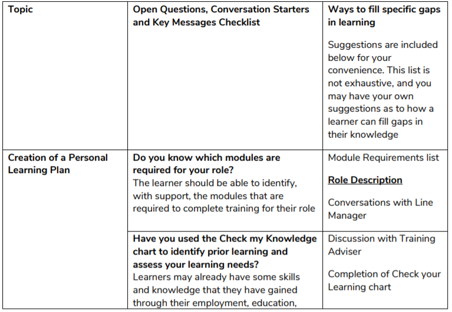
Part 2 - click to see the table in full screen.
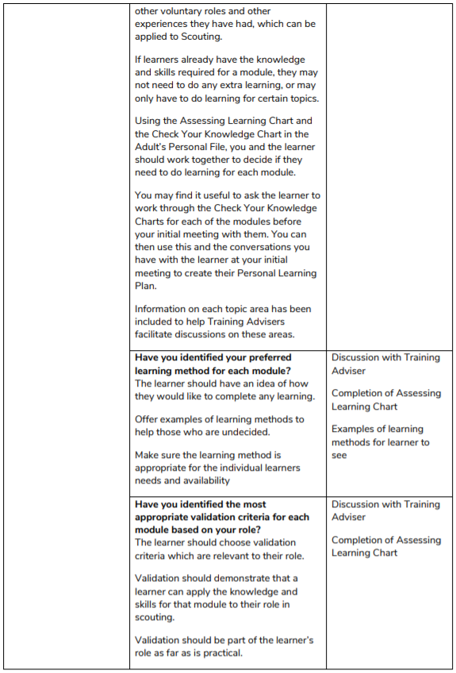
Part 3 - click to see the table in full screen.
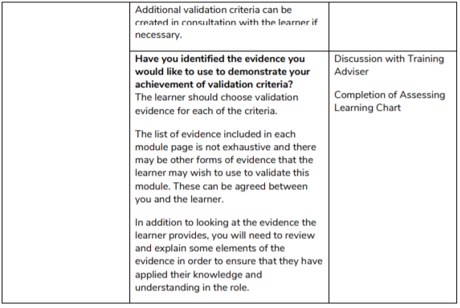
One to One
To validate this module, the learner will need to:
- Create and agree a Personal Learning Plan with their Training Adviser to allow them to complete the training requirements for their role, taking into account existing knowledge and skills.
Evidence you could use may include one or more of the following: completed Personal Learning Plan Document, discussion with the learner, focussing on how they will complete the training requirements of the role.
The list of evidence provided for each validation criteria is not exhaustive and there may be other forms of evidence that the learner may wish to use to validate this module. These can be agreed between you and the Learner. In addition to looking at the evidence the learner provides, you will need to review and prompt them to explain some elements of the evidence in order to ensure that they have applied their knowledge and understanding in their role.
Essential Information (01)
To provide all adults in Scouting with the essential information needed to get started in their role.
By doing this training you will:
- Understand the basics of Scouts’ volunteer training scheme.
- Learn about our movement’s history.
- Explore the fundamentals of Scouts and how to bring them to life.
- Understand the importance of the Safety and Safeguarding policies in keeping people safe while in the Scouts.
- Learn about our structure, and find out where you fit within Scouts and the support that’s available.
- Understand the Equal Opportunities policy, and how to make sure every member feels included and able to fully participate in Scouts.
Revalidation of this module is not required for any change in role.
eLearning
To validate the Module, you will need to:
- Complete the assessment at the end of the eLearning module, this will generate a certificate, the certificate is the validation needed for this training module.
Safety
To provide all adults in Scouting with an understanding of safety practice and responsibilities as a member of Scouts, to keep everyone safe.
By doing the e-learning you will:
- Understand the Safety Policy and your responsibilities for keeping young people and adults in our movement safe
- Be able to demonstrate how to assess and manage risk
- Understand the role of the leader in charge
- Know what to do in an emergency, and how to report incidents and near misses
- Know where to access safety resources, activity rules and guidance for the safe management of activities
Revalidation of this module is not required for any change in role. It is though required to be renewed every three years.
eLearning
To validate the Module, you will need to:
- Complete the assessment at the end of the eLearning module, this will generate a certificate, the certificate is the validation needed for this training module.
Safeguarding
To provide all adults in Scouting with an understanding of safeguarding practice and responsibilities as a member of Scouts, to keep everyone safe.
By doing this workbook you will:
- Understand the Safeguarding Policy and your responsibilities for keeping our young people, and adults at risk, safe
- Understand the Young People First Safeguarding Card Code of Conduct (Yellow Card)
- Know how to recognise abuse
- Know how to report concerns
- Know what to do to make Scouts safe
Revalidation of this module is not required for any change in role. It is though required to be renewed every three years.
eLearning
To validate the Module, you will need to:
- Complete the assessment at the end of the eLearning module, this will generate a certificate, the certificate is the validation needed for this training module.
Trustee Introduction
To provide the Charity or managing Trustees with information on their legal responsibilities and current regulations.
By doing this training you will:
- Understand the Executive Committee and trusteeship in Scouts
- Understand Scouts’ key policies
- Understand the roles and responsibilities of Executive Committee members and trustees in Scouts
Revalidation of this module is not required for any change in role.
eLearning
To validate the Module, you will need to:
- Complete the assessment at the end of the eLearning module, this will generate a certificate, the certificate is the validation needed for this training module.
Tools for the Role (Section Leaders) (03)
To provide Section Leaders and Section Supporters with basic information on the section they support, their role and area of responsibility, along with some practical help to get individuals started in their role.
- Main features of the section they support and how it fits into Scouting
- The roles and responsibilities of different people within their section
- The use of a variety of programme ideas through different types of activities
- Youth Shaped Scouting
- Promoting positive behaviour in their section
Revalidation of this module is required when changing sections.
These questions follow the topics covered in the trainers notes and are directly linked to the learning objectives for this module. The questions are designed to support you when establishing what the learner already knows, and any gaps in the learner’s knowledge. Once these gaps have been identified, you should work with the learner to identify ways in which they can be filled.
Part 1 - click to see the table in full screen.
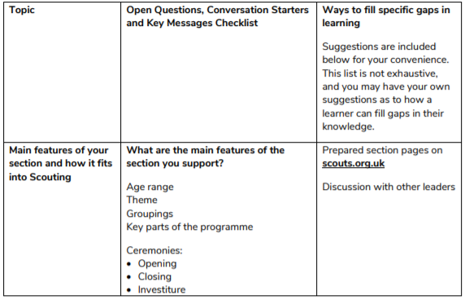
Part 2 - click to see the table in full screen.
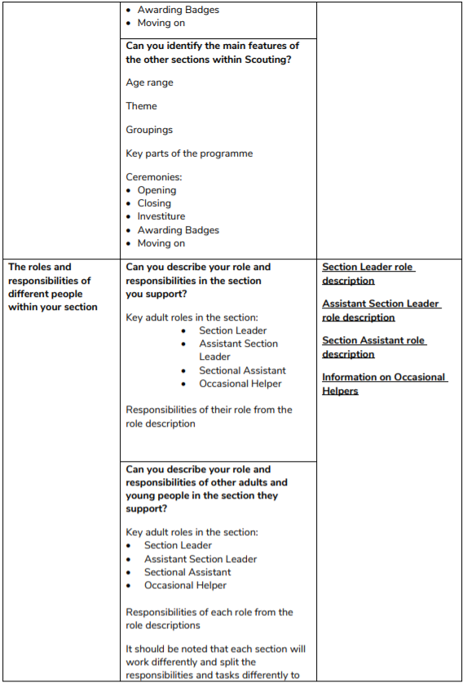
Part 3 - click to see the table in full screen.
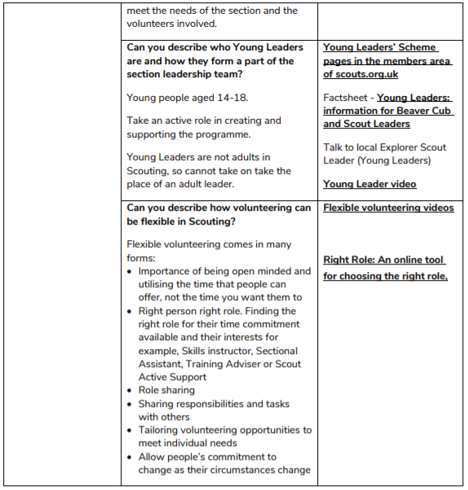
Part 4 - click to see the table in full screen.
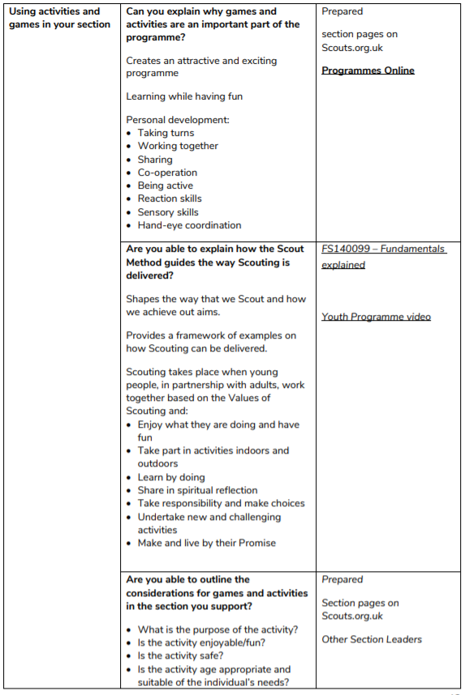
Part 5 - click to see the table in full screen.
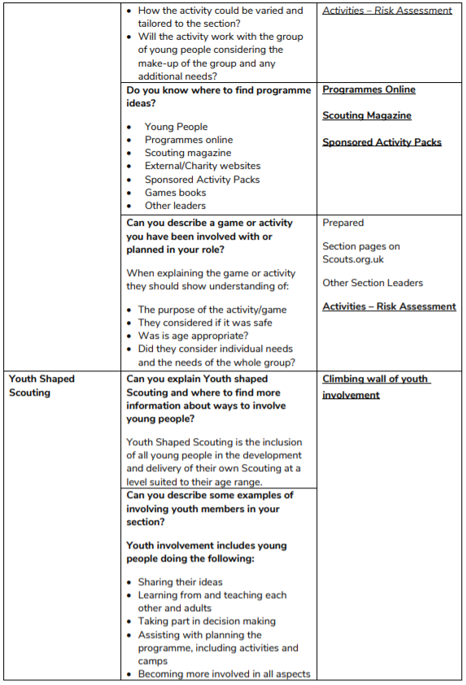
Part 6 - click to see the table in full screen.
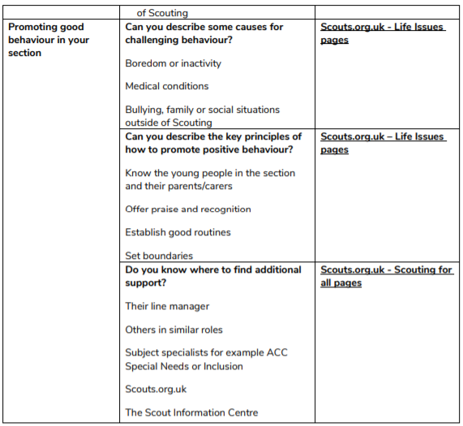
- Course
- One to One
- Small group
- e-learning
To validate this module the learner will need to complete one of the following:
- Plan and run, or assist in running a section meeting and reflect on this in a discussion with your Training
Adviser.
You should include:
- One activity or game appropriate to the section
- One ceremony appropriate to the section
Remember to consider:
- How the section leadership team will work together to deliver the meeting
- The key ceremonies for the section
- The key features of the section
- Why different games and activities are an important part of the programme
- Important considerations for activities and games in Scouting
- Sources of relevant programme ideas
- How to include the young people’s thoughts and ideas
- Ways to promote good behaviour throughout the meeting
Evidence you could use may include one or more of the following: A visit from your Training Adviser,
a written or verbal statement to your Training Adviser from an observer summarising your role in a section meeting, programme plans you have developed or assisted in the development of including information on activities, games, ceremonies or section meetings that you have run, instructions for running a game, activity or ceremony for your section including instructions for various members of the leadership team, photos/videos of you running activities, games or ceremonies or section meetings, discussion of evidence of activities, games, ceremonies or section meetings that you have run, this should focus on how you incorporated the elements listed into the section meeting and be accompanied by another form of evidence.
Any other ideas subject to agreement with your Training Adviser.
Additional validation criteria can be created in consultation with a Training Adviser if necessary. Any additional validation criteria created will need to check what you have learnt and that you can apply the skills that you have acquired to your role.
The list of evidence provided for each validation criteria is not exhaustive and there may be other forms of evidence that the learner may wish to use to validate this module. These can be agreed between you and the Learner. In addition to looking at the evidence the learner provides, you will need to review and prompt them to explain some elements of the evidence in order to ensure that they have applied their knowledge and understanding in their role.
General Data Protection Regulations (GDPR)
To provide all adults in Scouting with an understanding of what the General Data Protection Regulations (GDPR) means for them, their Scout Group, District and County and how to effectively align with it.
- Personal Data
- Individuals’ rights
- Consent
- Accountability & Governance
Revalidation of this module is not required for a change of role.
These questions follow the topics covered in the trainers notes and are directly linked to the learning objectives for this module. The questions are designed to support you when establishing what the learner already knows, and any gaps in the learner’s knowledge. Once these gaps have been identified, you should work with the learner to identify ways in which they can be filled.
Part 1 - click to see the table in full screen.
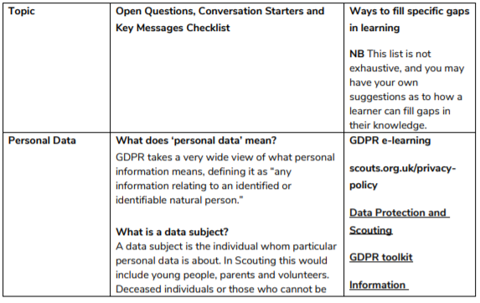
Part 2 - click to see the table in full screen.
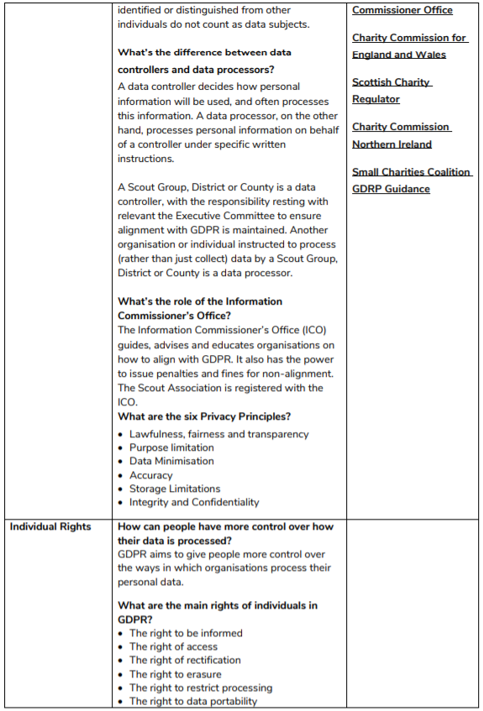
Part 3 - click to see the table in full screen.
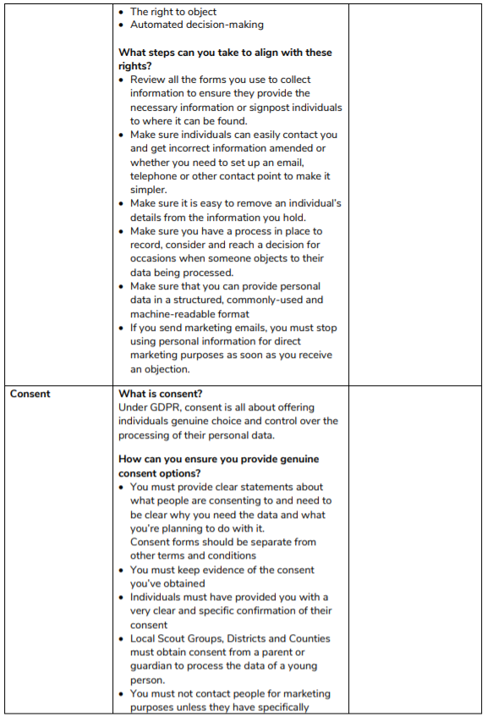
Part 4 - click to see the table in full screen.
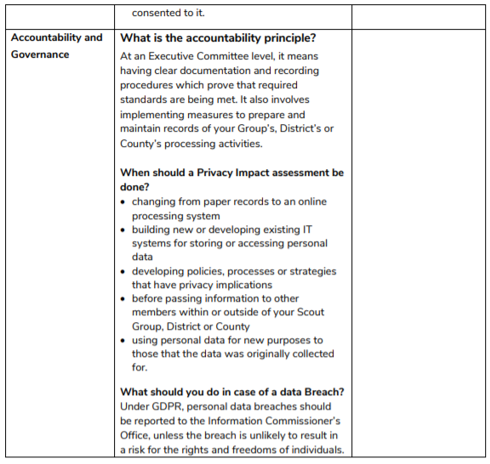
e-learning
To validate the Module the learner will need to:
- Complete the check your knowledge section at the end of the eLearning module, this will generate a certificate, the certificate is the validation needed for this training module.
Delivering a Quality Programme (12A)
To provide leaders, managers and supporters with information about how we deliver Scouting to young people and young adults, and how we ensure it meets their needs.
- Key elements of the programme for each section
- Badges and Awards
- Reviewing the programme
- The Young Leaders’ Scheme
- Youth Shaped Scouting
Partial Revalidation of this module is required when moving to a Manager or Supporter appointment; in which case learners must complete one of the manager specific validation criteria in light of their new role.
These questions follow the topics covered in the trainers notes and are directly linked to the learning objectives for this module. The questions are designed to support you when establishing what the learner already knows, and any gaps in the learner’s knowledge. Once these gaps have been identified, you should work with the learner to identify ways in which they can be filled.
Part 1 - click to see the table in full screen.
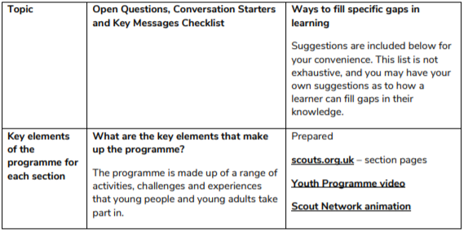
Part 2 - click to see the table in full screen.
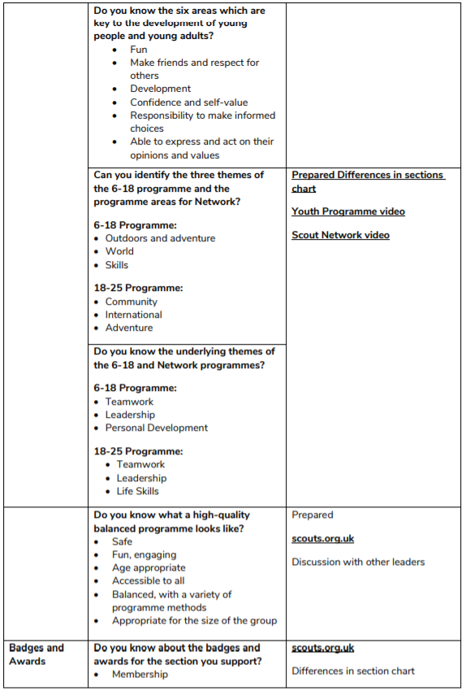
Part 3 - click to see the table in full screen.
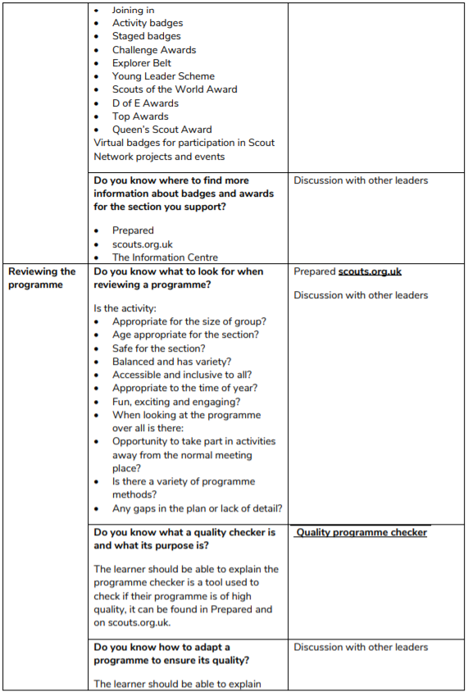
Part 4 - click to see the table in full screen.
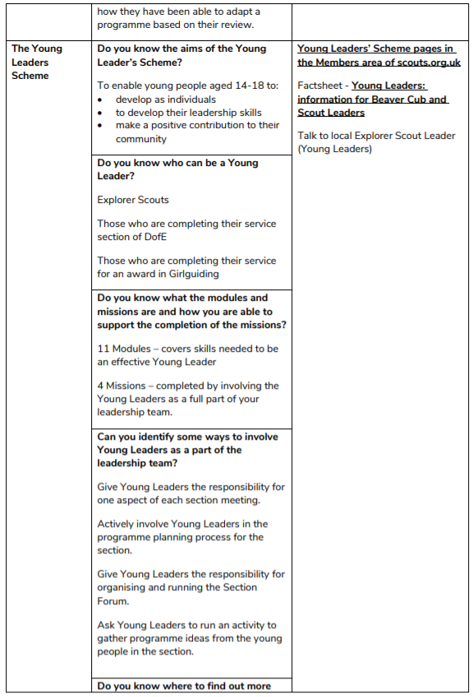
Part 5 - click to see the table in full screen.
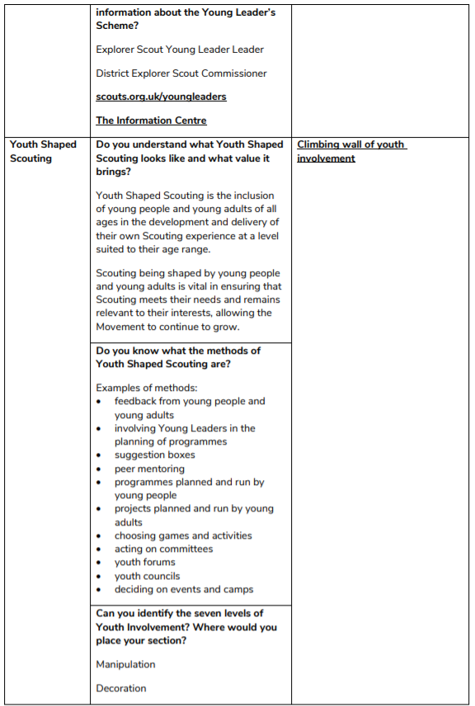
Part 6 - click to see the table in full screen.
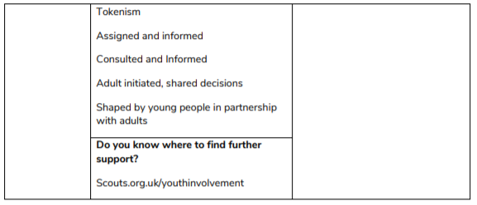
- Course
- One to one
- Small Group
- e-learning
To validate this module the learner will need to complete the following:
- Discuss their responses to the questions in the ‘Check your Knowledge’ chart with a Training Adviser; and reflect on the fundamental principles and key policies of Scouting with a Training Adviser to demonstrate their understanding and confidence to act in accordance with each core area.
Managers and Supporters will also need to complete one of the following:
- Complete a programme review with a section leadership team and outline the adaptations made to ensure a high-quality balanced programme
- Or complete a review for an event or project proposal initiated by a Scout Network member or Programme Coordinator. Evidence you could use may include one or more of the following: a copy of the completed programme or project review; a visit to the learner to observe the programme review; a verbal or written statement from an observer describing the learner’s contribution to the review; a
discussion with the learner covering the aspects of the programme review and the adaptations made. - Take part in a planning session with a section leadership team or a Scout Network project planning team, ensuring they cover the key elements of the programme. Evidence you could use may include one or more of the following: a copy of the completed programme plan or project proposal; a visit to the learner to observe the programme planning session; a verbal or written statement from an observer describing the learner’s contribution to the session; a discussion with the learner covering the aspects of the programme created including the key elements included.
- Show evidence of how they are providing and/or promoting Youth Shaped Scouting as part of
their role. Evidence you could use may include one or more of the following: written or verbal feedback they have gained from young people and an explanation of how they have made use of the
feedback; a visit from to the learner to a youth forum or council that they have enabled in some way; a verbal or written statement from an observer explaining how the learner has involved young people in deciding their programme. - Show evidence of how they are supporting the delivery of a high-quality balanced programme
as part of their role. Evidence you could use may include one or more of the following: observing the learner completing a visit to a section and discussing the support available with the leadership team;
planning material from the delivery of a District or County event for a section; evidence of how the learner has supported a training team to deliver training to new adults in Scouting; minutes from a District team meeting where the learner has discussed how to support a group or section; evidence from the learner of how they have mentored an adult new to Scouting in the delivery of a high quality balanced programme. - Any other ideas subject to agreement with your Training Adviser
Additional validation criteria can be created in consultation with the learner if necessary. Any additional validation criteria created will need to check the learner’s knowledge and that they can apply the skills acquired to their role in Scouting.
Section Leaders are also required to complete Programme Planning (12B)
The list of evidence provided for each validation criteria is not exhaustive and there may be other forms of evidence that the learner may wish to use to validate this module. These can be agreed between you and the learner. In addition to looking at the evidence the learner provides, you will need to review and prompt them to explain some elements of the evidence in order to ensure that they have applied their knowledge and understanding to their role.
The Fundamentals of Scouting (05)
To explore the Fundamentals of Scouting and the Religious Policy; and to consider their relationship with the high-quality balanced programme delivered to young people.
- The Values of Scouting in the high-quality balanced programme
- Using the Scout Method with young people
- Embedding spiritual development within the high-quality balanced programme
- The Scouts’ Religious Policy
Revalidation of this module is not required for any change of role.
These questions follow the topics covered in the trainers notes and are directly linked to the learning objectives for this module. The questions are designed to support you when establishing what the learner already knows, and any gaps in the learner’s knowledge. Once these gaps have been identified, you should work with the learner to identify ways in which they can be filled.
Part 1 - click to see the table in full screen.
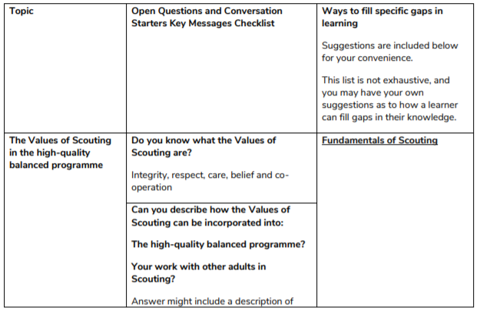
Part 2 - click to see the table in full screen.
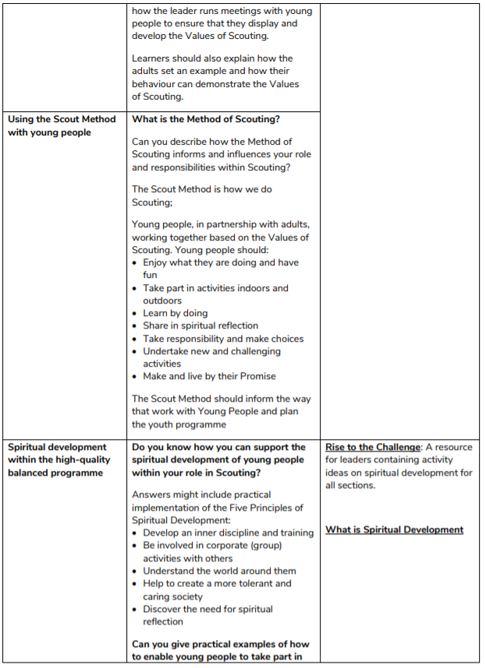
Part 3 - click to see the table in full screen.
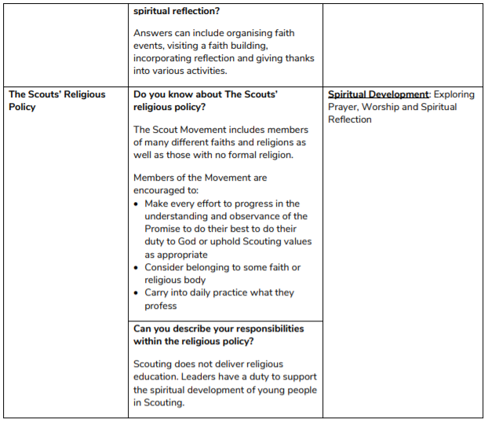
- Course
- One to one
- Small group
- e-learning
To validate this module, the learner will need to complete two of the following:
- How the Values, Purpose and Method of Scouting have been incorporated into the programme to
meet the needs of youth members of all sections. Evidence you could use may include one or more of the following: photographs and/or video of activities, a sectional visit to the learner, a written or verbal statement from an observer summarising the learner’s role in this activity, evidence of young people exploring the Values within an activity e.g. flip-charts, programme ideas for the section either side of the section the learner supports. - Deliver an activity to demonstrate the integration of spiritual development of young people within the programme. Provide practical examples of how faiths, beliefs and attitudes were explored. Evidence you could use may include one or more of the following: photographs and/or video of an activity, a sectional visit to the learner, a written or verbal statement from an observer summarising the learner’s role in this activity, evidence of young people exploring the values within an activity e.g. surveys, creative work, video clips, quotes, magazine article.
- Create a presentation or activity to explain the Religious Policy to either adults new to Scouting or
young people. Evidence you could use may include one or more of the following: a PowerPoint presentation and script, a video of delivery, paper evaluations from learners, a visit to observe the learner completing this activity, a written or verbal statement from an observer summarising the learner’s
role in this activity. - Deliver a Scouting event (e.g. camp, Scout’s Own) accessible to people representing different faiths
and beliefs. Evidence you could use may include one or more of the following: a list to demonstrate all the areas which reflect inclusivity, a video to demonstrate how young people have benefitted from attending a multi-faith event, a plan or photographs of a Scout’s Own, a script for a Scout’s Own with multi-faith reflections, a sectional visit to the learner, a written or verbal statement from an observer summarising the learner’s role in this activity. - Produce an action plan detailing how you would or have supported another adult in implementing the Values of Scouting in their role. Evidence you could use may include one or more of the following: a written action or development plan, a video or observation of a meeting with another adult as part of supporting them in implementing the Values of Scouting in their role.
- Any other ideas subject to agreement with your Training Adviser.
Additional validation criteria can be created in consultation with the learner if necessary. Any additional validation criteria created will need to check the learner’s knowledge and that they can apply the skills acquired to their role in Scouting.
The list of evidence provided for each validation criteria is not exhaustive and there may be other forms of evidence that the learner may wish to use to validate this module. These can be agreed between you and the learner. In addition to looking at the evidence the learner provides, you will need to review and prompt them to explain some elements of the evidence in order to ensure that they have applied their knowledge and understanding in their role.
Scouting for All (07)
To promote the policies of The Scouts that encourage inclusion and to consider how the individual, in their role, can help make Scouting available to all.
- Diversity and inclusion – The Scouts’ policies
- Diversity and inclusion – your own thoughts
- How you in your role can make Scouting accessible to all
- Social, cultural and religious diversity
Partial revalidation of this module is required when moving to a manager appointment, in which case learners must complete the manager specific validation criteria in light of their new role.
These questions follow the topics covered in the trainers notes and are directly linked to the learning objectives for this module. The questions are designed to support you when establishing what the learner already knows, and any gaps in the learner’s knowledge. Once these gaps have been identified, you should work with the learner to identify ways in which they can be filled.
Part 1 - click to see the table in full screen.
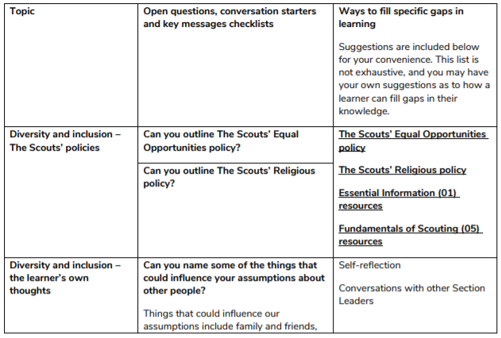
Part 2 - click to see the table in full screen.
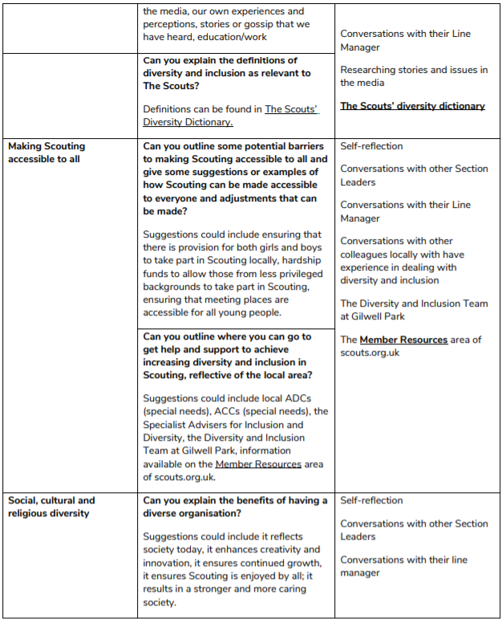
- Course
- One to one
- Small group
- Workbook
To validate this module the learner will need to complete one of the following:
Outline the Equal Opportunities Policy and explain how you are making Scouting a diverse and inclusive organisation by completing one of the following tasks:
- Show evidence of how you are making Scouting accessible to one or more of the following:
- Those with additional needs
- Girls and young women
- Those of minority ethnic communities
- Those of a variety of religious backgrounds
- Those of a variety of socio-economic backgrounds
Evidence you could use may include one or more of the following: a sectional visit to the learner observing them running an activity or game to increase awareness of additional needs or equal opportunities, a visit to the learner observing them running a recruitment event that highlights that Scouting is open to all, a written or verbal statement from an observer summarising the learner’s role in an activity to make Scouting more accessible, videos or photos of the learner running an activity or game, an article in a magazine/on the internet showing that Scouting is open to all.
- Any other ideas subject to agreement with your Training Adviser.
Additional validation criteria can be created in consultation with the learner if necessary. Any additional validation criteria created will need to check the learner’s knowledge and ensure that they can apply the skills acquired to their role in Scouting.
Managers should also:
Produce a plan to help their Group/District better reflect the community in which they live and give examples of how you are putting it into action. This could relate to any of the strands of diversity and inclusion.
Evidence you could use may include one or more of the following: a copy of a development plan, photos or videos demonstrating the learner putting the diversity plan into action, a visit to the learner observing them creating a plan, a visit to the learner where you observe them putting the plan into action through an activity or event, a written or verbal statement from an observer summarising the learner’s role in creating a plan, a written or verbal statement from an observer summarising the learner’s role in an activity or event to realise the plan, a discussion with the learner, the discussion should focus on their plan and activities or events they will use to put it into action and be accompanied by another form of evidence.
The list of evidence provided for each validation criteria is not exhaustive and there may be other forms of evidence that the learner wishes to use to validate this module. These can be agreed between you and the learner. In addition to looking at the evidence the learner provides, you will need to review and prompt them to explain some elements of the evidence in order to ensure that they have applied their knowledge and understanding in their role.
Administration (11)
To provide information and best practice on how to manage administrative tasks in Scouting.
- Administrative tasks and record keeping
- Member record management and the General Data Protection Regulations (GDPR)/ Data Protection Act
- Financial responsibilities and best practice
- Insurance arrangements
Revalidation of this module is not required for any change of role.
These questions follow the topics covered in the trainers notes and are directly linked to the learning objectives for this module. The questions are designed to support you when establishing what the learner already knows, and any gaps in the learner’s knowledge. Once these gaps have been identified, you should work with the learner to identify ways in which they can be filled.
Part 1 - click to see the table in full screen.
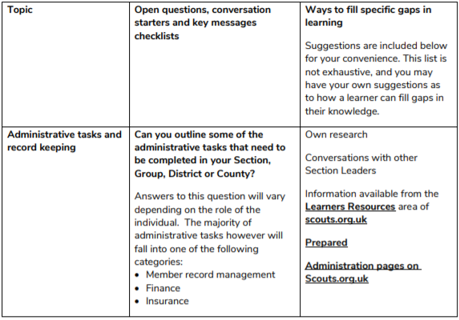
Part 2 - click to see the table in full screen.
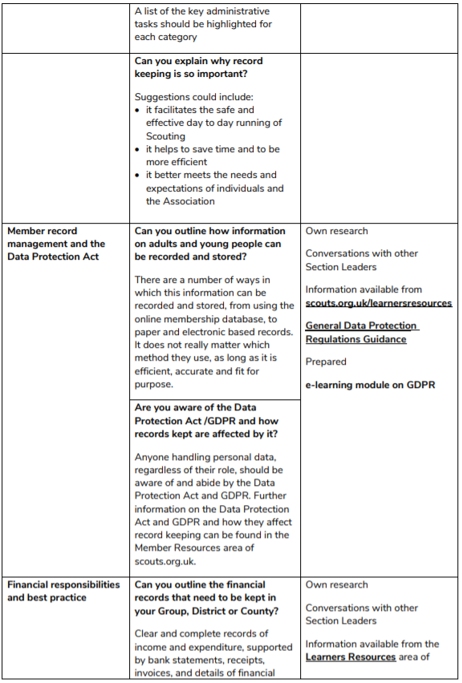
Part 3 - click to see the table in full screen.
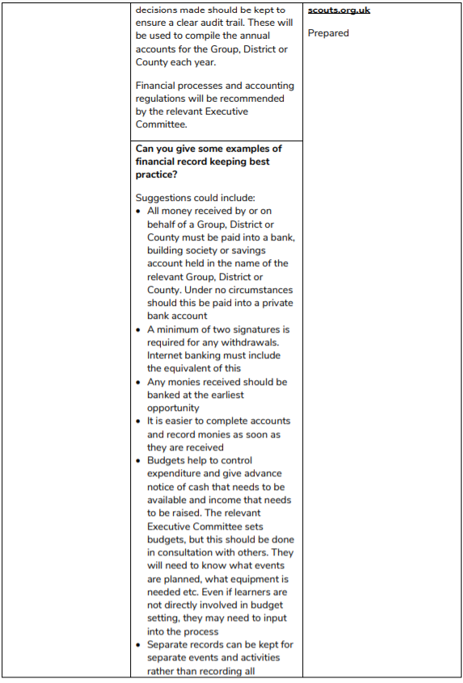
Part 4 - click to see the table in full screen.
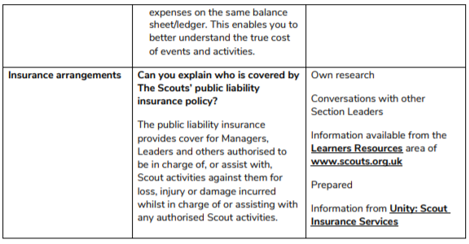
- Course
- One to one
- Small group
- Workbook
To validate this module the learner will need to complete one of the following:
- Demonstrate accurate and appropriate maintenance of administrative and financial records relevant to their role, in accordance with Policy, Organisation and Rules and the Data Protection Act / GDPR.
Evidence you could use may include one or more of the following: written material such as record
books, member records, spread sheets or databases that demonstrate accurate and appropriate maintenance of administrative and financial records (the exact format of the evidence will depend on the methods used to record necessary data), a written or verbal statement by an observer to testify that the learner maintains accurate administrative and financial records relevant to your role, in accordance with Policy, Organisation and Rules and the Data Protection Act. - Any other ideas subject to agreement with your Training Adviser.
Additional validation criteria can be created in consultation with the learner if necessary. Any additional validation criteria created will need to check the learner’s knowledge and that they can apply the skills acquired to their role in Scouting.
The list of evidence provided for each validation criteria is not exhaustive and there may be other forms of evidence that the learner may wish to use to validate this module. These can be agreed between you and the learner. In addition to looking at the evidence the learner provides, you will need to review and prompt them to explain some elements of the evidence in order to ensure that they have applied their knowledge and understanding in their role.
First Aid (10)
To cover the skills and knowledge necessary to enable adults to manage an incident and provide basic first aid.
- First Aid
Revalidation of this module is not required for any change of role.
These questions follow the topics covered in the trainers notes and are directly linked to the learning objectives for this module. The questions are designed to support you when establishing what the learner already knows, and any gaps in the learner’s knowledge. Once these gaps have been identified, you should work with the learner to identify ways in which they can be filled.
Click to see the table in full screen.
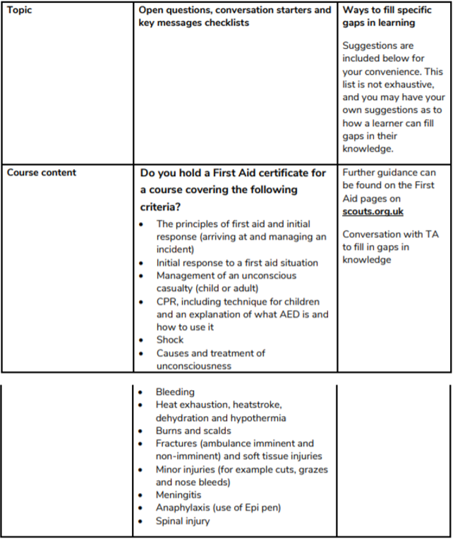
The learning for this module should be completed using one of the following delivery methods:
First Response –The First Response certificate is designed specifically for adults in Scouting, based on the situations and issues that occur within those roles. It is not therefore externally recognised. It can be delivered externally, or by an individual within Scouting who has a full first aid certificate. Further guidance can be found on the members area of our website.
To validate this module the learner will need to:
- Hold a current First Aid certificate that meets or exceeds the minimum standard of First Response.
- If a First Aid certificate that does not cover all the minimum criteria of First Response is held, the learner must demonstrate to the Training Adviser that they have developed the knowledge and practical knowledge to address the additional criteria in a First Aid incident.
Programme Planning (12B)
To provide Section Leaders with an opportunity to plan and review a sectional programme including the use of a variety of methods to generate programme ideas.
- How to create an exciting and relevant programme
- How to generate programme ideas
- How to review a programme to enhance it
Revalidation of this module is required for change of section.
These questions follow the topics covered in the trainers notes and are directly linked to the learning objectives for this module. The questions are designed to support you when establishing what the learner already knows, and any gaps in the learner’s knowledge. Once these gaps have been identified, you should work with the learner to identify ways in which they can be filled.
Part 1 - click to see the table in full screen.
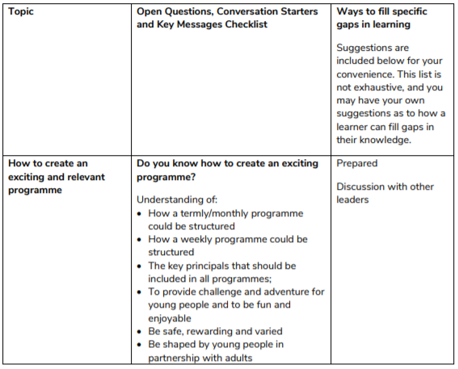
Part 2 - click to see the table in full screen.
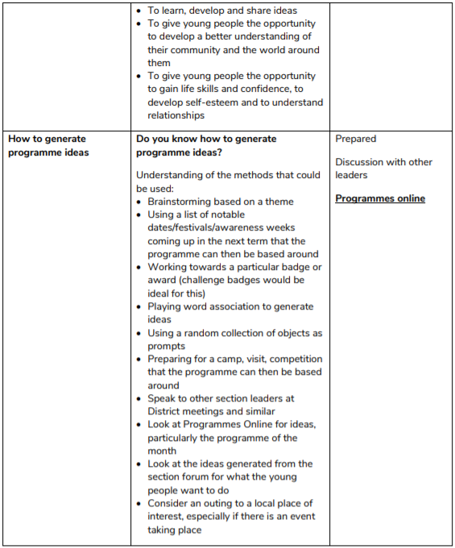
Part 3 - click to see the table in full screen.
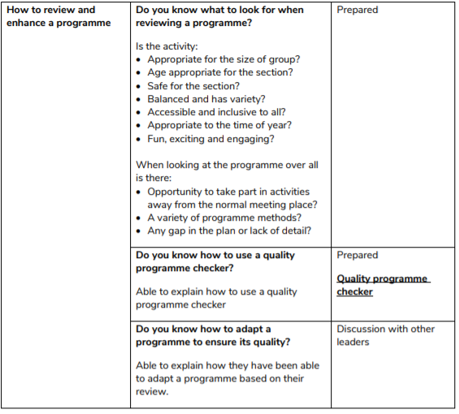
- Course
- One to One
- Small Group
To validate this module the learner will need to:
- Discuss the Check your Knowledge questions with the Training Adviser
And complete two of the following:
- Produce a Programme Plan (minimum one month). You should take into consideration:
- The key themes of the programme
- The underlying themes of the programme
- Incorporating a range of programme methods
- How young people are involved in the programme planning process
- Whether activities relate to badges and awards
- Evidence you could use may include one or more of the following: a visit to the learner’s programme planning meeting; a verbal or written statement from an observer describing the learner’s contribution to a programme planning meeting they have attended; programme plans and programme review documents; discussion with the learner about taking part in a programme planning meeting, focusing on how they incorporated the elements listed into the programme plan and accompanied by another form of evidence.
- Review their programme and produce evidence for how their review has improved the quality of future programmes and the programme planning process.
Evidence you could use may include one or more of the following: a visit to the learner, observing
them completing a programme review; a verbal or written statement from an observer describing the learner’s contribution to a programme review they have conducted; programme plans and programme review documents; discussion with the learner about completing a programme review, this focusing on how they improved future programmes using the results of the programme review and accompanied by another form of evidence. - Any other ideas subject to agreement with your Training Adviser.
Additional validation criteria can be created in consultation with a Training Adviser if necessary. Any additional validation criteria created will need to check what you have learnt and that you can apply the skills that you have acquired to your role.
The list of evidence provided for each validation criteria is not exhaustive and there may be other forms of evidence that the learner may wish to use to validate this module. These can be agreed between you and the Learner. In addition to looking at the evidence the learner provides, you will need to review and prompt them to explain some elements of the evidence in order to ensure that they have applied their knowledge and understanding in their role.
Running Safe Activities (17)
To enable adults to plan and run exciting, safe and developmental activities for the young people in their section.
- The importance of activities as a regular part of a high-quality balanced programme
- The processes that need to be followed to carry out any indoor or outdoor activities in Scouting
- Managing groups during the activity, including the leader in charge principle
- Planning suitable activities, with appropriate risk assessment and communication
- InTouch system, activity rules, parental permission, and procedures in event of an accident or incident
Revalidation of this module is required when changing from a Supporter role to a Leader role.
These questions follow the topics covered in the trainers notes and are directly linked to the learning objectives for this module. The questions are designed to support you when establishing what the learner already knows, and to identify any gaps in the learner’s knowledge. Once these gaps have been identified, you should work with the learner to identify ways in which these gaps can be filled.
Part 1 - click to see the table in full screen.
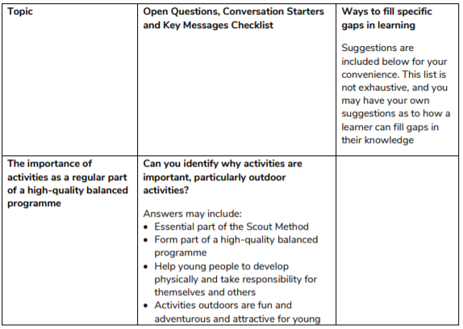
Part 2 - click to see the table in full screen.
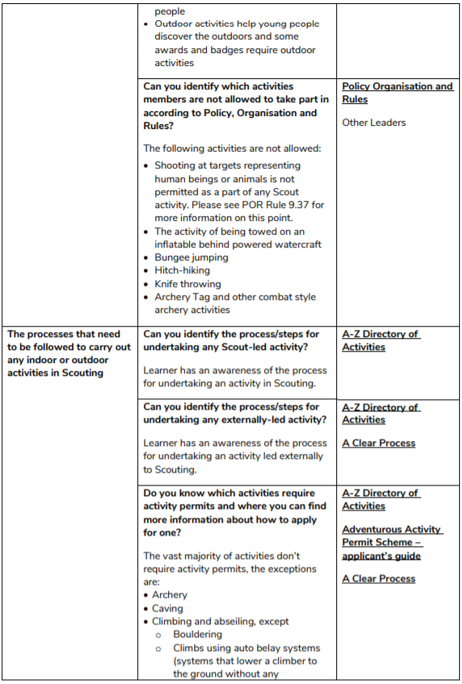
Part 3 - click to see the table in full screen.
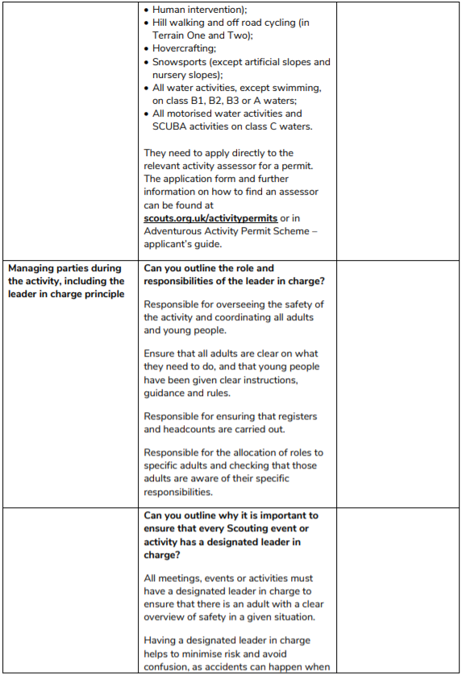
Part 4 - click to see the table in full screen.
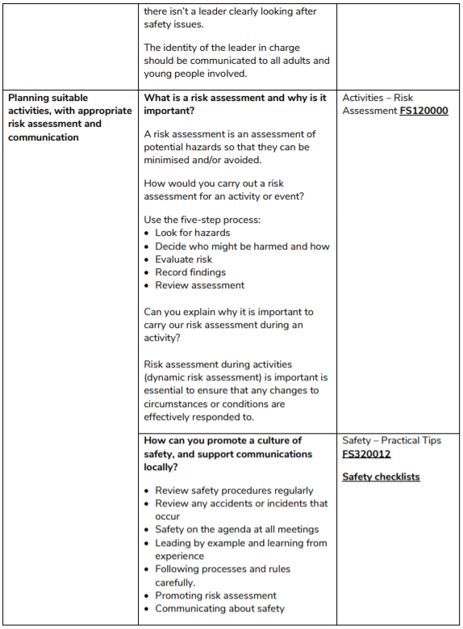
Part 5 - click to see the table in full screen.
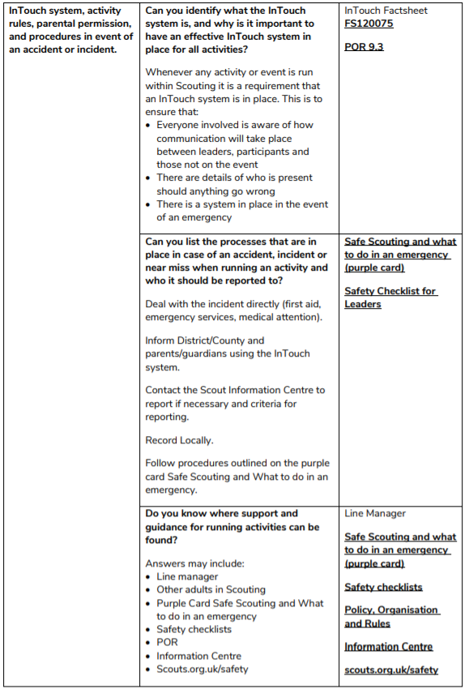
- Course
- One to one
- Small group
- Workbook
To validate this module the learner will need to complete two of the following:
- Plan, or assist in planning, an activity taking into account:
- The age, experience, fitness and additional needs of the group
- The rules related to the activity (including adult to young person ratios; any activity rules;
gaining approval from the relevant commissioner; etc.) o Any clothing, footwear, personal and group equipment needed for the activity and anticipated weather conditions - The need for a risk assessment to be carried out and communicated effectively
- The need for an InTouch system to be in place
Evidence you could use may include one or more of the following: a visit to observe the learner in a programme planning meeting, a written or verbal statement from an observer describing the learner’s role in planning an activity for the section, programme plans, risk assessments, InTouch procedure documents, registers, and letters to parents or budgets, a discussion with the learner, this should focus on how the learner has incorporated the criteria above when planning an activity for the section and should be accompanied by another form of evidence.
- Act as the leader in charge for an activity, taking into account the need to:
- Oversee the activity (ensuring that registers, headcounts etc. are in place)
- Co-ordinate the adults involved in the activity, allocating roles to specific adults and ensuring that they are clear on what they need to do
- Communicate relevant instructions, guidance and rules to young people involved in the activity
- Carry out dynamic risk assessment
Evidence you could use may include one or more of the following: a sectional visit to observe the learner acting as the leader in charge for an activity for the section, a written or verbal statement from an observer describing the learner’s role in acting as the leader in charge for an activity for the section, programme plans, risk assessments, InTouch procedure documents, registers, letters to parents or budgets, showing the perspective of the leader in charge, discussion with the learner, this should focus on how the learner incorporated the criteria above whilst acting as the leader in charge for an activity and should be accompanied by another form of evidence.
- Any other ideas subject to agreement with your Training Adviser.
Additional validation criteria can be created in consultation with the learner if necessary. Any additional validation criteria created will need to check the learner’s knowledge and that they can apply the skills acquired to their role in Scouting.
The list of evidence provided for each validation criteria is not exhaustive and there may be other forms of evidence that the learner may wish to use to validate this module. These can be agreed between you and the Learner. In addition to looking at the evidence the learner provides, you will need to review and prompt them to explain some elements of the evidence in order to ensure that they have applied their knowledge and understanding in their role.
Practical Skills (18)
To encourage adults to gain and develop practical skills for the benefit of the young people in their section.
- Learning practical skills
- Sharing practical skills with young people
Revalidation of this module is required when changing sections or changing from a Supporter role to a Leader role.
These questions follow the topics covered in the trainers notes and are directly linked to the learning objectives for this module. The questions are designed to support you when establishing what the learner already knows, and any gaps in the learner’s knowledge. Once these gaps have been identified, you should work with the learner to identify ways in which they can be filled.
Part 1 - click to see the table in full screen.
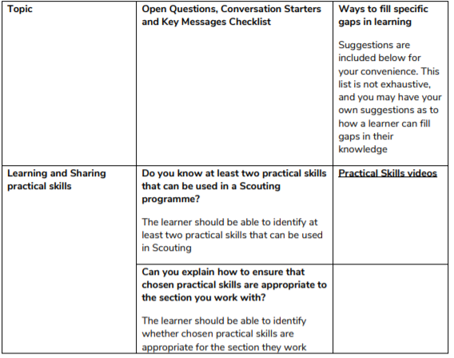
Part 2 - click to see the table in full screen.
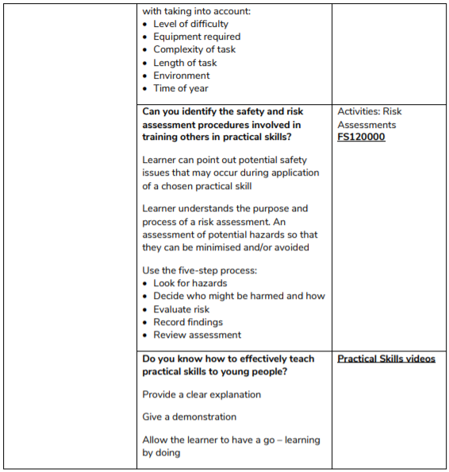
- Course
- Small group
To validate this module the learner will need to complete two of the following:
- Learn or develop a practical skill which can be used in Scouting
Evidence you could use may include one or more of the following: a visit to the learner for
observation, a written or verbal statement from an observer describing you demonstrating a practical skill the learner has learnt or developed; paperwork such as a qualification in a practical skill, photos or videos of the learner learning or developing a skill, discussion with the learner this will focus on their experience learning or developing a practical skill and should be accompanied by another form of evidence.
- Instruct a young person in carrying out two practical skills, ensuring that:
The skill is appropriate for the section the young person belongs to the young person is aware of, and follows, safety and risk assessment procedures.
Evidence you could use may include one or more of the following: a visit to the learner for
observation, a written or verbal statement from an observer describing the learner instructing young people in a practical skill, Programme plans, instructions for carrying out a practical skill, risk assessments for an activity carrying out a practical skill, photos or videos of the learner instructing a young person in a practical skill, discussion with the learner, this will focus on their role instructing a young person in a practical skill and should be accompanied by another form of evidence.
- Demonstrate two practical skills, at least one of these skills is one that you have learnt or developed
in your role in Scouting, ensuring that:- the skill is appropriate for the section they work with
- safety and risk assessment procedures are followed appropriate
Evidence you could use may include one or more of the following: a visit to observe the learner, a
written or verbal statement from an observer describing you demonstrating a practical skill the learner have learnt or developed, photos or videos of the learner demonstrating two practical skills, a qualification in a practical skill, programme plans, instructions for carrying out a practical skill, risk assessments for carrying out a practical skill discussion with the learning, this will focus on the learner demonstrating a practical skill and should be accompanied by another form of evidence.
- Any other ideas subject to agreement with your Training Adviser
Additional validation criteria can be created in consultation with the learner if necessary. Any additional validation criteria created will need to check the learner’s knowledge and that they can apply the skills acquired to their role in Scouting.
The list of evidence provided for each validation criteria is not exhaustive and there may be other forms of evidence that the learner may wish to use to validate this module. These can be agreed between you and the Learner. In addition to looking at the evidence the learner provides, you will need to review and prompt them to explain some elements of the evidence in order to ensure that they have applied their knowledge and understanding in their role.
Introduction to Residential Experiences (16)
An overview of the role of residential experiences for young people in Scouting, and their organisation and planning.
- The role of residential experiences in the development of young people
- Organisation and administration of residential experiences
- Skills required within a team running a residential experience
- The nights away permit scheme
- Support and further information for planning a residential experience
Please note that the nights away permit scheme is operated separately from the Adult Training Scheme. The learner will be required to complete additional training and assessment separately from the completion and validation of this module if they wish to achieve a night’s away permit.
Revalidation of this module is only required if the new role contains a substantial increase in responsibility for residential experiences. The revalidation for this module should be discussed with the learner and their line manager to determine whether it is necessary in their new role.
These questions follow the topics covered in the trainers notes and are directly linked to the learning objectives for this module. The questions are designed to support you when establishing what the learner already knows, and any gaps in the learner’s knowledge. Once these gaps have been identified, you should work with the learner to identify ways in which they can be filled.
Part 1 - click to see the table in full screen.
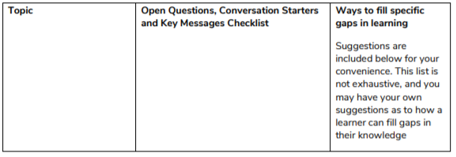
Part 2 - click to see the table in full screen.
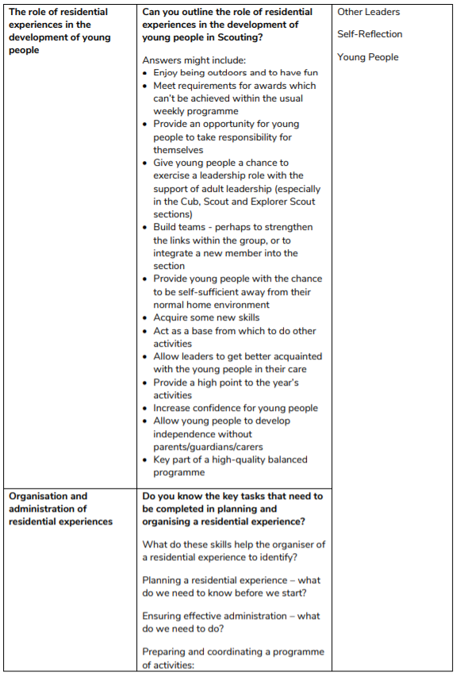
Part 3 - click to see the table in full screen.
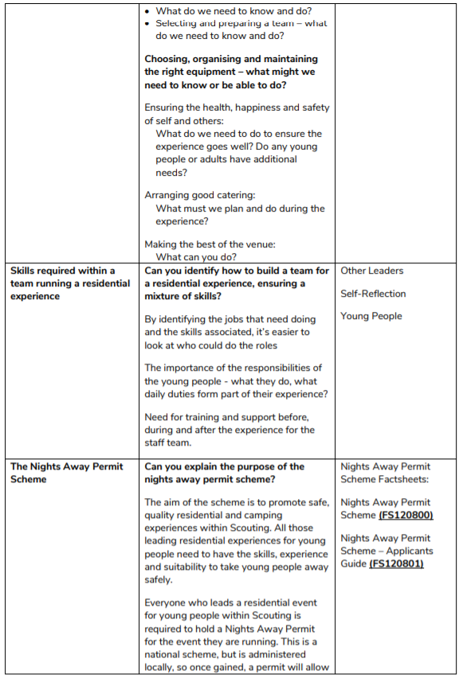
Part 4 - click to see the table in full screen.
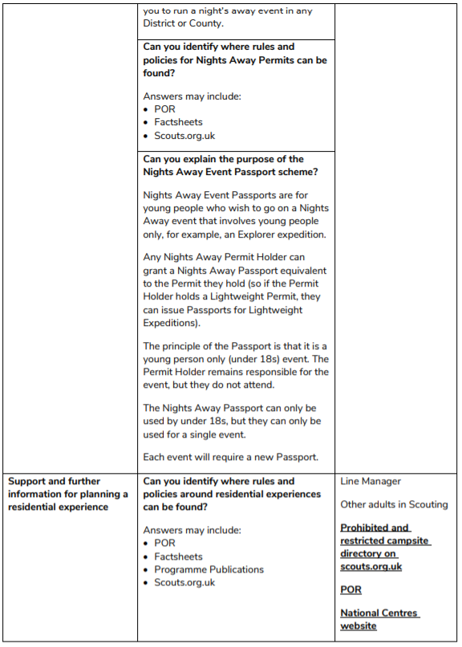
Part 5 - click to see the table in full screen.

- Course
- One to one
- Small group
If the learner holds the Nights Away Permit, this will count as validation for this module.
To validate this module the learner will need to:
- Complete the Residential Experiences Quiz with their Training Adviser
Evidence: The completed Residential Experiences Quiz included with this module, the learner will need to reflect on their answers in discussion with you.
And complete one of the following:
- Assist with planning and supporting a residential experience and describe or show evidence of how the role that you played in planning and supporting this event addressed two of the following areas:
- the main aspects of organisation and administration
- selecting a team and the roles undertaken by the team
- appropriate adult to young person ratios
- identifying and dealing with potential issues (logistics, behaviour, budget)
- where additional support and information can be gathered
Evidence you could use may include one or more of the following: team rotas, letters to parents or contingency planning documents from a residential experience, a visit to a camp briefing in which the learner is playing a part, a written or verbal statement from an observer describing the learner’s role in planning or supporting a residential experience, discussion with the learner, this should focus on the role that they played in planning or supporting the residential experience and be accompanied by another form of evidence.
- Show evidence of how they are promoting and providing opportunities for young people in the section to take part in residential experiences. Describe how these opportunities are benefiting the young people in the section.
Evidence you could use may include one or more of the following: discussion with the learner, this should focus on the learner’s role in promoting and providing opportunities for residential experiences to the young people in the section and be accompanied by another form of evidence, paperwork produced to promote and provide opportunities for young people in the section. A sectional visit to the learner, a written or verbal statement from an observer describing your role in providing opportunities for residential experiences to young people through assisting with information evenings, or games and activities to support residential experiences. - Any other ideas subject to agreement with your Training Adviser.
Additional validation criteria can be created in consultation with the learner if necessary. Any additional validation criteria created will need to check the learner’s knowledge and that they can apply the skills acquired to their role in Scouting.
The list of evidence provided for each validation criteria is not exhaustive and there may be other forms of evidence that the learner may wish to use to validate this module. These can be agreed between you and the learner. In addition to looking at the evidence the learner provides, you will need to review and prompt them to explain some elements of the evidence in order to ensure that they have applied their knowledge and understanding in their role.
Question 1. Why do we have a Nights Away Permit Scheme?
The Nights Away Permit scheme aims to promote safe, quality residential and camping experiences within Scouts.
This is how we make sure Scouts volunteers have the skills, experience and suitability to take young people away safely.
Question 2. Who needs a Nights Away Permit?
Everyone who leads a residential event for young people in Scouts must hold a Nights Away Permit for the event.
Question 3. What are the four types of Nights Away Permit available to leaders?
Indoor, Campsite, Green field, Lightweight Expedition
Question 4. True or false?
A) A Beaver Leader with a Nights Away Permit can lead an Explorer camp.
True. Permits aren’t section specific. All leaders may hold any permit and can lead camps in other sections.
B) A Green Field permit holder can’t lead a camp on a campsite.
False. Volunteers with a Green Field permit can lead any category of residential event. Campsite-category permit holders can only lead campsite or indoor-category events. Lightweight expedition or indoor-category permit holders can only lead residential events within that category.
Question 5. What’s the maximum length of time a permit can last?
Permits are valid for up to five years.
Question 6. Is a Nights Away Permit needed for each County/Area/ Region in which you camp?
The Nights Away Permit Scheme is a national scheme administered locally. When volunteers are granted a permit, they can run a Night’s Away Event in any District or County/Area/Region (Scotland).
Question 7. Family camps are a good way to enthuse parents. Which sections can attend a family camp?
All sections can attend. Groups and Districts can organise family Nights Away events for young people accompanied by their parents/carers and siblings.
They aim to introduce the Scout Method to parents, and strengthen the links between sections and Groups in the District.
Question 8. Which sections can attend Nights Away activities?
All sections can attend Nights Away activities. There are no specific restrictions on younger sections (Squirrel Scouts and Beaver Scouts) taking part in residential activities, except for the section ratios.
Question 9. True or false?
A) Parents don’t need to have any safeguarding checks to attend a family camp.
False. All adults must have completed the appropriate criminal records checks before attending a Family Camp.
B) Parents or supporters will need to have extra insurance to cover them on a family camp.
True. Members are covered by The Scout Association’s general insurance policies. Non-members, such as occasional helpers, supporters, parents and carers, are not provided with the same automatic Personal Accident Insurance cover. They should consider purchasing additional insurance, which the County may already have purchased (the trainer should check this information beforehand).
Question 10. What are the ways international residential experiences may be organised?
International events (for example World Scout Jamborees) organised by HQ.
Organised by a travel company.
Organised by someone holding a relevant Nights Away Permit.
Question 11. Where can you find more information about international residential experiences?
On the International Scouts and Events and Volunteering abroad sections of the website or by contacting your local international representative.
In England, Wales and Northern Ireland this is the ACC or AAC International. In Scotland, contact the Regional Adviser for International.
Question 12. What are Nights Away Event Passports, and who are they for?
Nights Away Event Passports exist to enable young people in the Scouts and Explorers sections, who are deemed suitably skilled, to undertake a nights away activity as a peer group, such as patrol camps and expeditions, with remote supervision from their adult permit holder.
Question 13. True or false?
A) Any Permit holder can grant a Nights Away Event Passport.
True. Any Nights Away Permit holder can grant a Nights Away Event Passport equivalent to the permit they hold. For example, if the permit holder has a lightweight expedition passport, they can issue passports for lightweight expeditions.
B) The permit holder who grants the Nights Away Event Passport must attend the event.
False. The permit holder remains responsible for the event, but they don’t need to attend. The permit holder must put in place a supervision plan which enables them to monitor the group as well as providing a mechanism for the group to raise concerns, issues and challenges should they occur.
C) The Nights Away Event Passport can only be used by under 18s, but they can be used for multiple events.
False. The Nights Away Passport can only be used by under 18s for a single occasion. Each event will require a new Passport.
D) An Explorer Scout Young Leaders with a Nights Away Event Passports can’t lead a camp for the sections they volunteer with.
True. Nights Away Event Passports can’t be used for Explorer Scout Young Leaders leading activities for the sections they volunteer with, or for activities where adults will be present with the group.
International (19)
To provide an international focus appropriate to their section and appreciate the global nature of Scouting.
- The nature of world Scouting
- International events
- International aspects of the high-quality balanced programme
- Benefits of international activities to young people
Revalidation of this module is not required for any change of role.
These questions follow the topics covered in the trainers notes and are directly linked to the learning objectives for this module. The questions are designed to support you when establishing what the learner already knows, and any gaps in the learner’s knowledge. Once these gaps have been identified, you should work with the learner to identify ways in which they can be filled.
Part 1 - click to see the table in full screen.
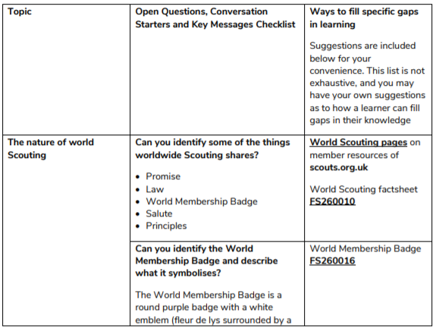
Part 2 - click to see the table in full screen.
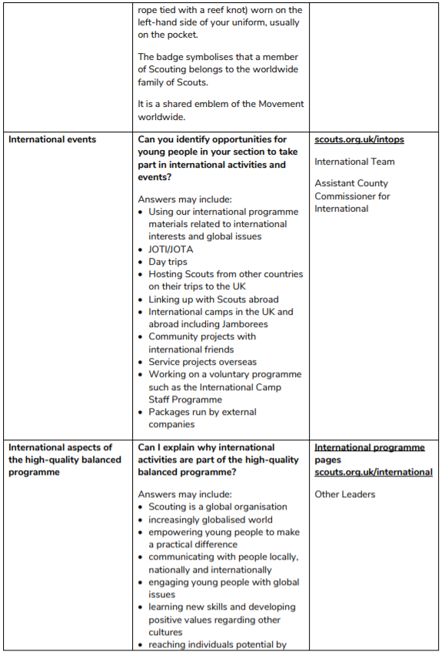
Part 3 - click to see the table in full screen.
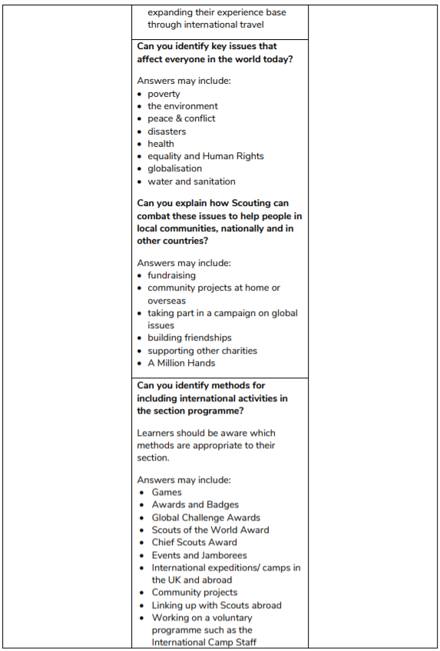
Part 4 - click to see the table in full screen.
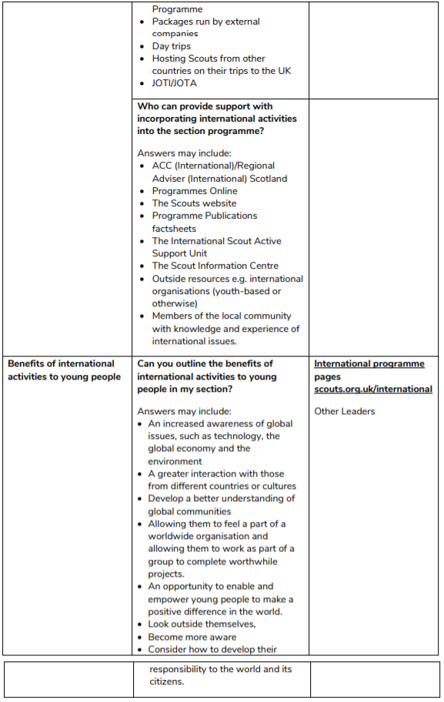
- Course
- One to one
- Small group
To validate this module the learner will need to:
- Review the programme for the section they support and make adjustments to ensure it incorporates international activities.
Evidence you could use may include one or more of the following: a visit from to observe the learner completing a programme review, a written or verbal statement from an observer describing the learner completing a programme review, programme plans and programme review documents, photos or videos of the learner conducting a programme review, discussion with the learner, this should focus on how they completed the programme review and adjustments made and should be accompanied by another form of evidence.
And complete two of the following:
- Plan and run an international themed event or activity for young people exploring either:
- The global nature of Scouting
- The role of the world membership badge
- International events in Scouting
Evidence you could use may include one or more of the following: a visit from to observe the learner
planning and running an activity; a written or verbal statement from an observer describing the learner’s role in planning and running an activity with the young people in the section, programme plans, instructions for an event or activity with young people, photos of videos of a game or activity the learner has run, discussion with the learner, this should focus on their role in running a game or activity for young people and should be accompanied by another form of evidence.
- Be involved in the planning and running of an international trip, for example a camp abroad, including producing an event plan.
Evidence you could use may include one or more of the following: a visit from to a planning meeting or international trip, a written or verbal statement from an observer describing the learner’s role in the planning and running of an international trip, letters to parents for the international trip, an event plan, discussion with the learner, this should focus on their role planning and running an international trip and should be accompanied by another form of evidence. - Support young people taking part in an international experience.
Evidence you could use may include one or more of the following: a visit from to a planning meeting the learner is supporting, a sectional visit that showcases the learner’s support to young people taking part in an international experience, a written or verbal statement from an observer describing your role in providing support to young people attending an international experience, letters and other resources created to support young people on an international experience, discussion with the learner, this should focus on their role providing support to young people attending an international experience and should be accompanied by another form of evidence.
- Establish or actively maintain a link, and exchange information, with a Scout Group outside the UK.
Evidence you could use may include one or more of the following: a visit to a JOTI/JOTI event
the learner is taking part in with a group outside the UK, a sectional visit, letters between the groups, trips to visit the group, photos of the group, photos, videos or screenshots of JOTI/JOTA contact with your link group, a written or verbal statement from an observer describing your role in running a game, activity or section meeting which supports your link to a Scout Group outside the UK, discussion with the learner, this should focus on their role in establishing and maintaining a link with a group outside the UK and should be accompanied by another form of evidence. - Any other ideas subject to agreement with your Training Adviser.
Additional validation criteria can be created in consultation with the learner if necessary. Any additional validation criteria created will need to check the learner’s knowledge and that they can apply the skills acquired to their role in Scouting.
The list of evidence provided for each validation criteria is not exhaustive and there may be other forms of evidence that the learner may wish to use to validate this module. These can be agreed between you and the Learner. In addition to looking at the evidence the learner provides, you will need to review and prompt them to explain some elements of the evidence in order to ensure that they have applied their knowledge and understanding in their role.
Supporting Young People (14)
To enable adult volunteers working with young people, to understand and meet their needs.
- Characteristics and development of young people
- External influences on young people
- Creating a supportive environment for young people
- Responding to issues affecting young people
Revalidation of this module is required when changing sections or changing from a Supporter role to a Leader role.
These questions follow the topics covered in the trainers notes and are directly linked to the learning objectives for this module. The questions are designed to support you when establishing what the learner already knows, and any gaps in the learner’s knowledge. Once these gaps have been identified, you should work with the learner to identify ways in which they can be filled.
Part 1 - click to see the table in full screen.
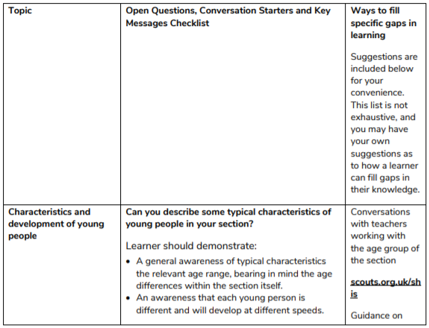
Part 2 - click to see the table in full screen.
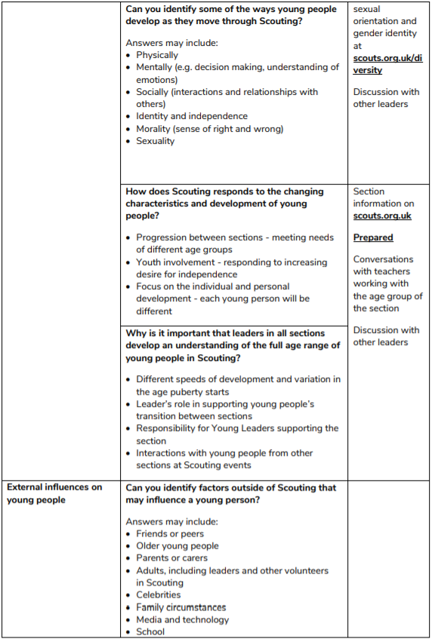
Part 3 - click to see the table in full screen.
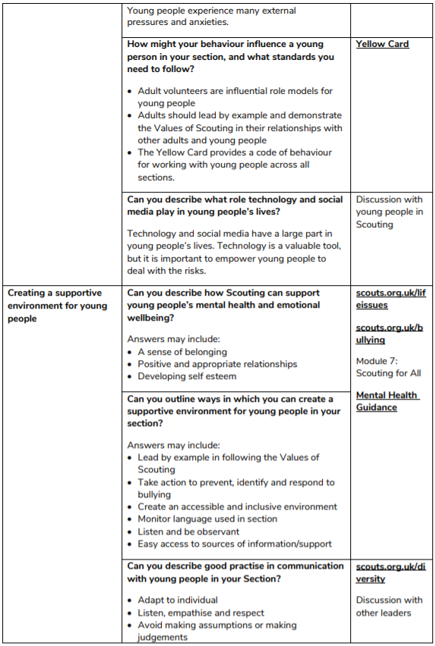
Part 4 - click to see the table in full screen.
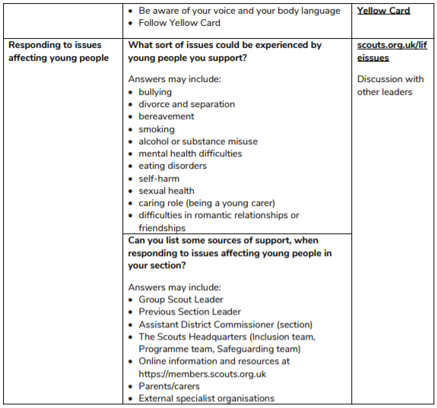
- Course
- One to one
- Small group
- Workbook
To validate this module the learner will need to complete one of the following:
- Outline how your section provides a supportive environment for young people.
Evidence you could use may include one or more of the following: discussion with the learner
about specific examples of strategies to create a supportive environment; a written report about specific examples of strategies to create a supportive environment. - Create an action plan to develop the supportive environment in your section.
Evidence you could use may include one or more of the following: discussion with the learner about their action plan including specific examples of steps taken to ensure a supportive Environment; a copy of an action plan including specific examples of steps taken to ensure a supportive environment. - Show evidence of communicating appropriately with young people as part of their role.
Evidence you could use may include one or more of the following: observing the learner at a
Section meeting; verbal or written statement from an observer describing how the learner communicates with young people in the section.
And complete one of the following:
- Show evidence of responding effectively to issues affecting young people in the section
Evidence you could use may include one or more of the following: verbal or written statement from line manager or another adult volunteer in the section about a situation the learner has responded to; discussion with the learner about a situation the learner has responded to. - Plan and deliver an activity raising awareness of some of the issues experienced by young people
Evidence you could use may include one or more of the following: a sectional visit, notes from an activity run with the young people from the learner’s section, a verbal or written statement from an observer describing an activity the learner has run with the young people in the section, discussion with the learner, this should focus on a game or activity they have run with the young people in the section and be accompanied by another form of evidence. - Other ideas subject to agreement with the Training Adviser.
Additional validation criteria can be created in consultation with the learner if necessary. Any additional validation criteria created will need to check the learner’s knowledge and that they can apply the skills acquired to their role in Scouting.
The list of evidence provided for each validation criteria is not exhaustive and there may be other forms of evidence that the learner may wish to use to validate this module. These can be agreed between
you and the learner. In addition to looking at the evidence the learner provides, you will need to review and prompt them to explain some elements of the evidence in order to ensure that they have applied their knowledge and understanding in their role.
Promoting Positive Behaviour (15)
To enable adult volunteers to proactively promote positive behaviour and appropriately manage challenging behaviour in their section
- Defining challenging behaviour
- Planning for positive behaviour; principles and strategies
- Responding to challenging behaviour
- Additional help and support for challenging behaviour
Revalidation of this module is required when changing sections or changing from a Supporter role to a Leader role.
These questions follow the topics covered in the trainers notes and are directly linked to the learning objectives for this module. The questions are designed to support you when establishing what the learner already knows, and any gaps in the learner’s knowledge. Once these gaps have been identified, you should work with the learner to identify ways in which they can be filled.
Part 1 - click to see the table in full screen.
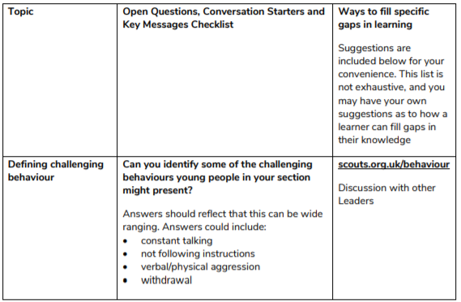
Part 2 - click to see the table in full screen.
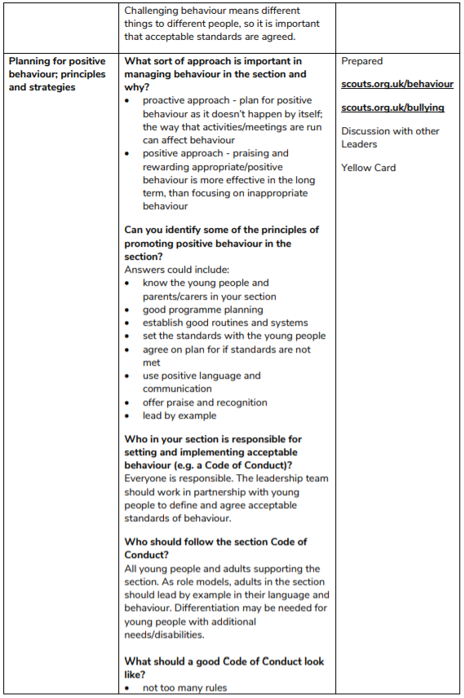
Part 3 - click to see the table in full screen.
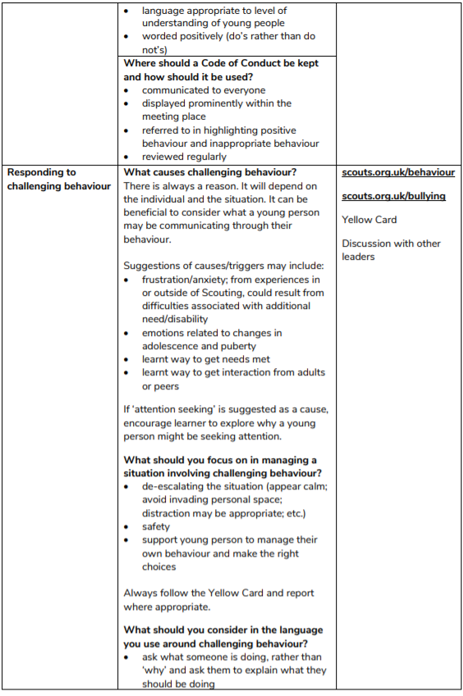
Part 4 - click to see the table in full screen.
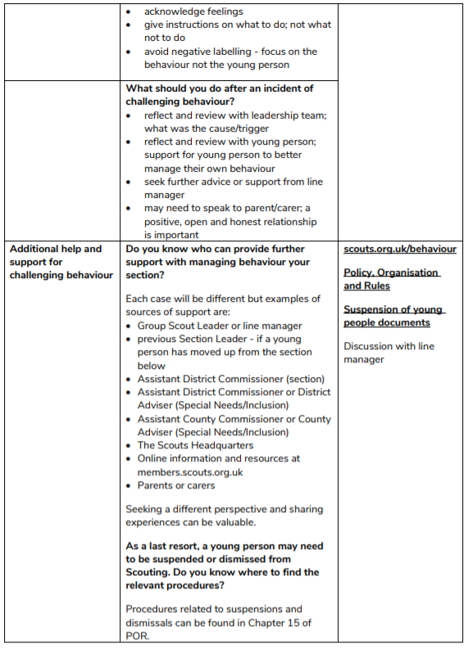
- Course
- One to one
- Small group
- Workbook
To validate this module the learner will need to complete one of the following:
- Work in partnership with young people to develop or review a Code of Conduct for the section.
Evidence you could use may include one or more of the following: copy of the section Code of
Conduct; notes from a meeting with the young people in the section to develop/review a section code of conduct; a sectional visit to the learner; a verbal or written statement from an observer describing the learner’s role in developing/reviewing a Code of Conduct. - Outline strategies used to promote positive behaviour in your section.
Evidence you could use may include one or more of the following: discussion with the learner
including specific examples of appropriate strategies; a written report about promoting positive behaviour in the section including specific examples of appropriate strategies. - Plan and run a game or activity that explores acceptable and unacceptable behaviour with the young people of your section.
Evidence you could use may include one or more of the following: a sectional visit; notes from a
game or activity run with the young people from the learner’s section, a verbal or written statement from an observer describing a game or activity the learner has run with the young people in the section, discussion with the learner, this should focus on a game or activity they have run with the young people in the section and be accompanied by another form of evidence.
And also complete one of the following:
- Show evidence of de-escalating an incident of challenging behaviour appropriately.
Evidence you could use may include one or more of the following: a verbal or written statement
from an observer describing the learner’s role in dealing with an incident of challenging behaviour; discussion with the learner focusing on responding to an incident of challenging behaviour. - Show evidence of responding effectively following an incident of challenging behaviour; reflecting and reviewing with the adult leadership team, the young person and, where appropriate, the parent.
Evidence you could use may include one or more of the following: an action plan for managing
challenging behaviour in the section; notes from a meeting with a parent/carer to discuss a young person’s behaviour and plan support strategies; discussion with the learner focusing on the learner’s role in developing an action plan. - Any other ideas subject to agreement with the Training Adviser.
Additional validation criteria can be created in consultation with the learner if necessary. Any additional
validation criteria created will need to check the learner’s knowledge and that they can apply the skills acquired to their role in Scouting.
The list of evidence provided for each validation criteria is not exhaustive and there may be other forms of evidence that the learner may wish to use to validate this module. These can be agreed between you and the learner. In addition to looking at the evidence the learner provides, you will need to review and prompt them to explain some elements of the evidence in order to ensure that they have applied their knowledge and understanding in their role.
Growing the Section (13)
To cover ways in which an adult volunteering in a section can assist their line manager and others to plan for and contribute to the growth of their section and/or group.
- The importance of growth in Scouting
- Recruitment and retention of young people
- Recruitment and retention of adults
- Tools and support to help develop the sections
Revalidation of this module is required when changing sections or changing from a Supporter role to a Leader role.
These questions follow the topics covered in the trainers notes and are directly linked to the learning objectives for this module. The questions are designed to support you when establishing what the learner already knows, and any gaps in the learner’s knowledge. Once these gaps have been identified, you should work with the learner to identify ways in which they can be filled.
Part 1 - click to see the table in full screen.

Part 2 - click to see the table in full screen.
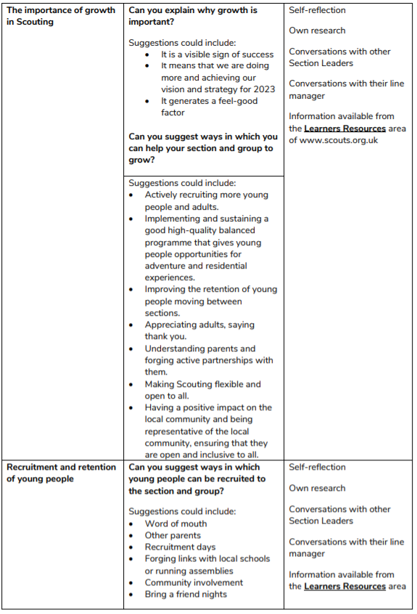
Part 3 - click to see the table in full screen.
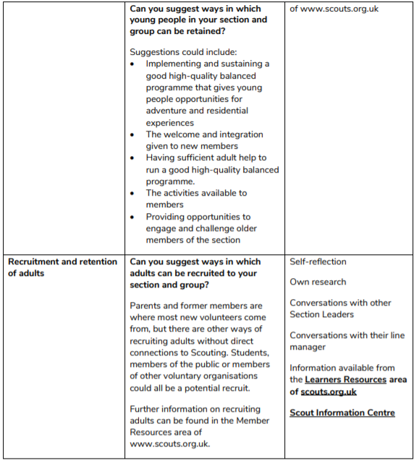
Part 4 - click to see the table in full screen.
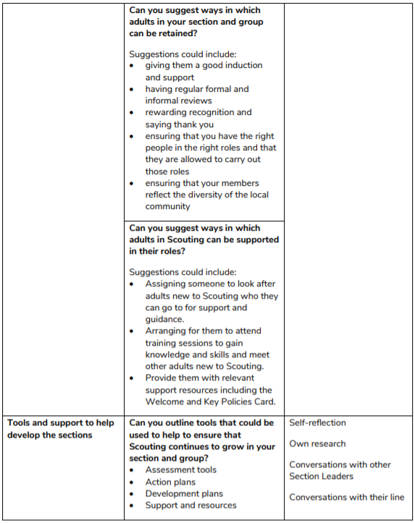
Part 5 - click to see the table in full screen.
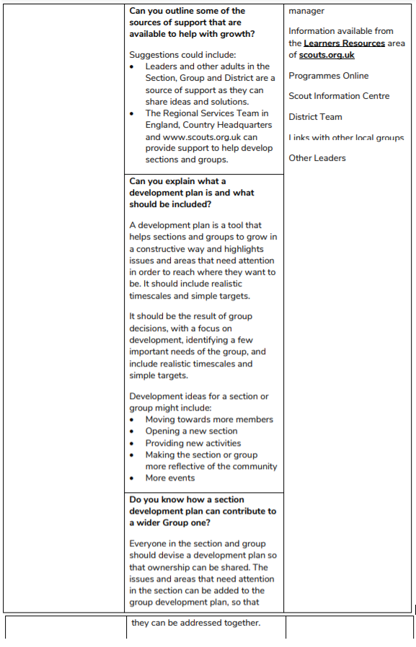
- Course
- One to one
- Small group
- Workbook
To validate this module the learner will need to:
Explain the role that they play in the recruitment and retention of young people and adults and explain why growing Scouting is important, giving examples of new members (adults or young people) who have joined Scouting as a direct result of action they have undertaken, and the steps that they took to enable this to happen.
And complete two of the following:
- Work with others to produce and implement a development plan for their section or group.
Evidence you could use may include one or more of the following: a section or group development plan, a verbal or written statement to from an observer describing the learner’s role in producing a development plan and giving examples of how you are implementing it, discussion with the learners regarding producing and implementing a development plan, this should focus on how the learner implemented the development plan to grow the section or group and be accompanied by another form of evidence. - Run or take part in a recruitment event to help grow their section and group.
Evidence you could use may include one or more of the following: a visit to observe the learner
taking part in a recruitment event to help grow the section or group, a verbal or written statement from an observer describing the learner's role in a recruitment evening, discussion about a recruitment evening the learner has taken part in, this should focus on the learner’s role in the evening and be accompanied by another form of evidence. - Give examples of how they are being flexible and meeting the needs, wants and time commitments
of adults when recruiting them.
Evidence you could use may include one or more of the following: a visit from to a meeting of the learner with potential new recruits, a verbal or written statement from an observer describing the learner’s role in meeting with potential new recruits and outlining how they can be flexible to meet the needs, wants and times of the volunteers, discussion with the learner, this should focus on examples of how the learner is being flexible and meeting the needs, wants and time commitments of adults when recruiting them and be accompanied by another form of evidence. - Demonstrate how you have effectively used the transfer methods between sections, your role in Moving On, Membership Awards and age-range flexibility, giving examples of young people who you have recently helped to move between sections, reviewing anything you think could be done better in future.
Evidence you could use may include one or more of the following: A moving on plan for the young people in the section the learner supports, a verbal or written statement from an observer describing the learner’s role in successfully helping young people to move between sections and giving examples of how this was done, discussion with the learner, this should focus on the learner’s role in the moving on process and highlight anything they think could be done better in future and be accompanied by another form of evidence. - Any other ideas subject to agreement with your Training Adviser.
Additional validation criteria can be created in consultation with the learner if necessary. Any additional
validation criteria created will need to check the learner’s knowledge and that they can apply the skills acquired to their role in Scouting.
The list of evidence provided for each validation criteria is not exhaustive and there may be other forms of evidence that the learner may wish to use to validate this module. These can be agreed between you and the learner. In addition to looking at the evidence the learner provides, you will need to review and prompt them to explain some elements of the evidence in order to ensure that they have applied their knowledge and understanding in their role.
Working with Adults (09)
To understand the underlying functions required to work effectively as a member of an adult team.
- Effective communication
- Listening skills
- Decision-making structures
- Representing others
Revalidation of this module is not required for any change of role.
These questions follow the topics covered in the trainers notes and are directly linked to the learning objectives for this module. The questions are designed to support you when establishing what the learners already knows, and any gaps in the learner’s knowledge. Once these gaps have been identified, you should work with the learner to identify ways in which they can be filled.
Part 1 - click to see the table in full screen.
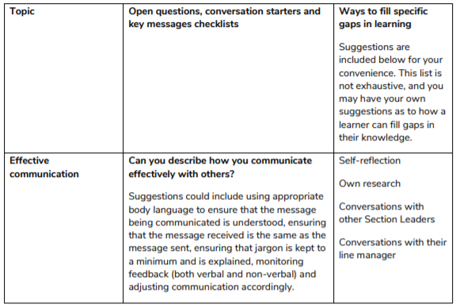
Part 2 - click to see the table in full screen.
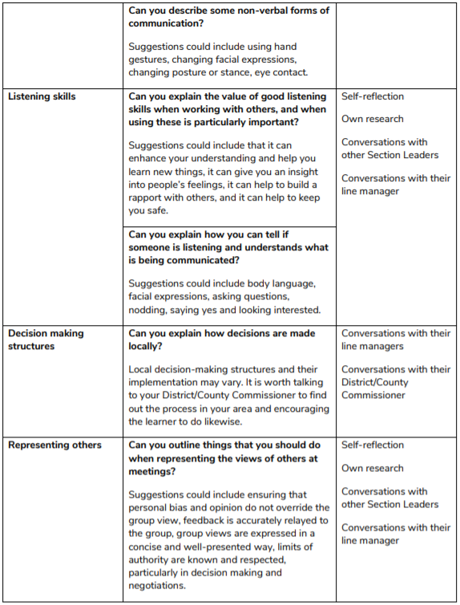
- Course
- Small group
To validate this module the learner will need to complete two of the following:
- Represent others at a Scout meeting and report back on the decisions made and the reasons for
them.
Evidence you could use may include one or more of the following: a discussion with the learner about their role in representing others at a Scout meeting, a visit to a Scout meeting to observe the learner representing others’ views, a written or verbal report from an observer describing you representing others at a Scout meeting. - Demonstrate how you have helped someone make decisions (without breaking confidentiality), including describing the techniques of effective listening and how these were applied.
Evidence you could use may include one or more of the following: a discussion with the learner
about how they helped someone make decisions (including describing techniques of effective listening and how these were applied), notes from a meeting of the learner and a colleague where the learner helped them make decisions (without breaking confidentiality). - Demonstrate your ability to understand different aspects of verbal and non-verbal communication and implement appropriate responses.
Evidence you could use may include one or more of the following: a discussion with the learner about different aspects of verbal and non-verbal communication, a presentation of the learner’s
own research on different aspects of verbal and non-verbal communication to you or another adult in Scouting. - Any other ideas subject to agreement with your Training Adviser
Additional validation criteria can be created in consultation with the learner if necessary. Any additional
validation criteria created will need to check the learner’s knowledge and that they can apply the skills acquired to their role in Scouting.
The list of evidence provided for each validation criteria is not exhaustive and there may be other forms of evidence that the learner may wish to use to validate this module. These can be agreed between you and the Learner. In addition to looking at the evidence the learner provides, you will need to review and prompt them to explain some elements of the evidence in order to ensure that they have applied their knowledge and understanding in their role.
Skills of Leadership (08)
To introduce models, tools and techniques that will enable adults to be effective leaders of other adults and of young people.
- Systematic planning
- Theory of leadership
- Leadership styles
Revalidation of this module is not required for any change of role.
These questions follow the topics covered in the trainers notes and are directly linked to the learning objectives for this module. The questions are designed to support you when establishing what the learners already knows, and any gaps in the learner’s knowledge. Once these gaps have been identified, you should work with the learner to identify ways in which they can be filled.
Part 1 - click to see the table in full screen.
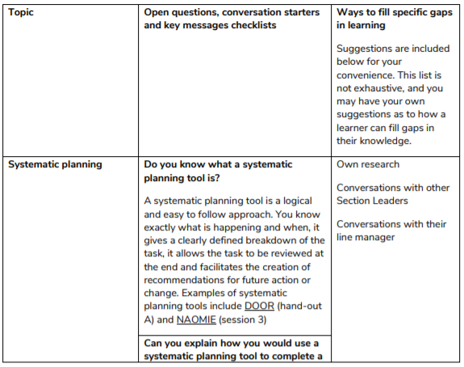
Part 2 - click to see the table in full screen.
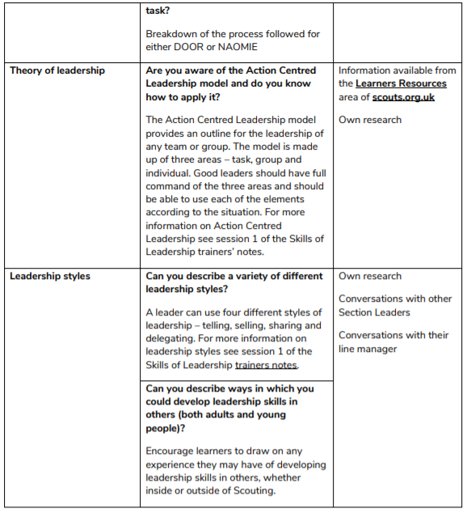
- Course
- One to one
- Small group
To validate this module the learner will need to complete two of the following:
- Use a systematic planning tool to complete a task, provide evidence of your use of the tool and
discuss the experience with your Training Adviser.
Evidence you could use may include one or more of the following: notes on the planning, execution and review of a task using a systematic planning tool, a written or verbal report by an observer describing the learner’s completion of a task using a systematic planning tool. - Explain the Action Centred Leadership model and apply it to an activity which they have run
recently.
Evidence you could use may include one or more of the following: a discussion with the learner about an activity the learner has run recently and how the learner applied the Action Centred Leadership model to it, a written or verbal report by an observer describing the learner applying the action centred leadership model, a written plan for a recent activity showing how the Action Centred Leadership model was applied. - Using a questionnaire, or similar tool, identify your preferred leadership style, and how it impacts
on your role in Scouting. Reflect on the four different leadership styles and consider how they inform your working in your section or Group or District Leadership Team.
Evidence you could use may include one or more of the following: a discussion with the learner
about the four different leadership styles and their role in the learners section or Group, a discussion with the learner exploring how their preferred leadership style impacts on their role in Scouting, a questionnaire highlighting their preferred learning style to be discussed with the learner alongside other evidence. - Produce evidence showing how you have led an event or activity during which your leadership
style changed several times.
Evidence you could use may include one or more of the following: a discussion with the learner, a written or verbal report by an observer about an event or activity where the learner’s leadership style changed several times, videos showing an event or activity where the learner’s leadership style changed a number of times. - Run a game or activity to develop leadership skills in young people or adults
Evidence you could use may include one or more of the following: videos or photos of the learner
running a game or activity to develop leadership skills, a visit to the learner to observe a game or activity to develop leadership skills, a written or verbal report by an observer about a game or activity the learner has led to develop leadership skills. - Any other ideas subject to agreement with your Training Adviser
Additional validation criteria can be created in consultation with the learner if necessary. Any additional
validation criteria created will need to check the learner’s knowledge and that they can apply the skills acquired to their role in Scouting.
The list of evidence provided for each validation criteria is not exhaustive and there may be other forms of evidence that the learner may wish to use to validate this module. These can be agreed between you and the learner. In addition to looking at the evidence the learner provides, you will need to review and prompt them to explain some elements of the evidence in order to ensure that they have applied their knowledge and understanding in their role
Assessing Learning (25)
Providing the knowledge, skills and attitudes to effectively support, validate and assess adults in The Scouts’ Adult Training Scheme, the Adventurous Activity Permit Scheme, Nights Away Permit Scheme and the Scout Show National Recognition Scheme.
- Understanding the scheme in which you are supporting adults
- Identifying learning and development needs
- Undertaking appropriate assessments and validations
- Providing positive and constructive feedback
- Providing support for learners
Any other change in role.
- Course
- One to one
- Small group
- Workbook
To validate this module the learner will need to meet the validation criteria as laid out below for the particular role they are taking on:
If they are a Training Adviser:
- Demonstrate an understanding of The Scouts’ Adult Training Scheme
- Support one learner through the Personal Learning Plan process over a period of five months or for the completion of Getting Started, if appropriate. This must include the validation of at least one module
- Discuss how they have supported the learner through the validation by answering these questions:
- How do you ensure that you can support a learner with special needs?
- Explain how you encouraged additional learning when a learner was not able to complete validation.
- Describe how you would use any evidence that has been presented to you in the discussion with the learner.
- How would you encourage a learner to explore their knowledge and experience to establish their understanding of the validation criteria?
- Create a PLP and detail how you, along with the learner, came to an agreement on timescales and learning methods.
If they are a Training Adviser for Managers and Supporters:
- Demonstrate an understanding of The Scouts’ Adult Training Scheme, particularly the Leadership
and Management Training. - Support one learner in a Manager or Supporter role through the Personal Learning Plan process over a period of five months or for the completion of Getting Started, if appropriate. This must include the validation of at least one module.
- Discuss how they have supported the learner through the validation by answering these questions:
- How do you ensure that you can support a learner with special needs?
- Explain how you encouraged additional learning when a learner was not able to complete validation.
- Describe how you would use any evidence that has been presented to you in the discussion with the learner.
- How would you encourage a learner to explore their knowledge and experience to establish their understanding of the validation criteria?
- Create a PLP and detail how you, along with the learner, came to an agreement on timescales and learning methods.
If they are a Nights Away Adviser:
- Demonstrate an understanding of The Nights Away Permit Scheme, particularly the assessment process
- Make at least one recommendation for the award of a Nights Away Permit
- Discuss the assessment with a Training Adviser, including answering these questions:
- How do you ensure that you can support an applicant/learner with special needs?
- Explain how you encouraged additional learning when an applicant/learner was not ready for assessment.
- Describe how you would use any evidence that has been presented to you in the discussion with the applicant/learner.
- How would you encourage an applicant learner to explore their knowledge and experience to establish their understanding of the assessment criteria?
- How did you communicate with the applicant/learner about their input into the preparation for the nights away experience?
If they are an Activity Assessor:
- Understand the Adventurous Activity Permit Scheme, particularly the assessment process,
- Make an assessment according to current Scouts’ factsheet recommendations,
- Make at least one recommendation for a permit and discuss the assessment with a Training Adviser including answering the following questions:
- How do you ensure that you can support an applicant/learner with special needs?
- Explain how you encouraged additional learning when an applicant/learner was not ready for assessment.
- Describe how you would use any evidence that has been presented to you in the discussion with the applicant/learner.
- How would you encourage an applicant learner to explore their knowledge and experience to establish their understanding of the assessment criteria?
- How have you ensured that your learner has the right skills for the permit being assessed?
- How do you ensure that your learner understands the relevant safety guidelines for the activity?
If they are a Scout show assessor:
- Understand the Scout Show National Recognition Scheme
- Carry out one assessment
Instructing Practical Skills (27)
To provide the skills, knowledge and attitudes necessary to instruct practical skills.
- Planning and running practical skills instruction
- Instructing and demonstrating practical skills to both adults and young people
- Taking and using feedback for future planning
Revalidation of this module is not required for any change of role.
- Course
- One to one
- Small group
To validate this module the learner will need to:
Discuss the module content and objectives with a Training Adviser and construct a portfolio of evidence of instructing practical skills
Notes
This module is one of a number targeted at those who wish to be Trainers in The Scouts. Therefore, there is no choice of validation method. All the criteria need to be met and a portfolio of evidence produced.
For further information and the detail of this module see the Guide to Instructing Practical Skills.
Facilitating (28)
To provide the skills, knowledge and attitudes to facilitate individuals and small groups.
- Relating to others in a learning situation
- Communicating effectively in a learning situation
- Working with a small group
- Working with individuals
- Helping individuals to solve their own problems
Revalidation of this module is not required for any change of role.
- Course
- One to one
- Small group
To validate this module the learner will need to:
Discuss the module content and objectives with a Training Adviser and construct a portfolio of
evidence of facilitating.
Notes
This module is one of a number targeted at those who wish to be Trainers in The Scouts. Therefore,
there is no choice of validation method. All the criteria need to be met and a portfolio of evidence
produced.
For further information and the detail of this module see the Guide to Facilitating
Presenting (29)
To provide the skills, knowledge and attitudes to make effective presentations.
- Understanding the purpose of a presentation
- Planning a presentation to meet objectives
- Using learning methods
- Using resources and facilities
- Delivering a presentation
- Collecting and using feedback
Revalidation of this module is not required for any change of role.
- Course
- One to one
- Small group
To validate this module the learner will need to:
Discuss the module content and objectives with a Training Adviser and construct a portfolio of
evidence of presenting.
Notes
This module is one of a number targeted at those who wish to be Trainers in The Scouts. Therefore,
there is no choice of validation method. All the criteria need to be met and a portfolio of evidence
produced.
For further information and the detail of this module see the Guide to Presenting.
Supporting Local Learning (30)
To provide the skills, knowledge and attitudes for Local Training Managers to coordinate the learning plans of individuals to produce a programme of learning.
- Communicating effectively with relevant parties
- Allocating appropriate Training Advisers to individuals
- Collating learning plans
- Demonstrating how to complete all necessary administration procedures
- Monitoring the progress of individual learning
Revalidation of this module is not required for any change of role.
- Course
- One to one
- Small group
To validate this module the learner will need to:
Discuss their role with a Training Adviser and how they provide practical support to learning locally.
And complete two of the following:
- List the individuals who come within their remit and their current training needs
- Keep accurate records of the progress of individuals through their Personal Learning Plans
- Provide accurate briefings on a regular basis to their County/ Area/ Region Training Manager of the needs of their area
- Collate individual plans into a learning needs summary
- List and explain the factors to consider when allocating Training Advisers to individual learners
- Brief a new Training Adviser on their role
- Explain the administrative procedures required to support local learning
- Ensure individual learning is monitored
- Any other ideas, subject to agreement with a Training Adviser
Planning a Learning Experience (31)
To provide the skills, knowledge and attitudes necessary to research and design training experiences.
- Understanding the purpose of a learning experience
- Using systematic planning to plan a learning experience
- Planning a balanced learning experience to meet objectives
- Producing material to support the learning experience
- Producing a plan to evaluate the learning experience
Revalidation of this module is not required for any change of role.
- Course
- One to one
- Small group
To validate this module the learner will need to:
Discuss the module content and objectives with a Training Adviser and construct a portfolio of
evidence of planning a learning experience.
Notes
This module is one of a number targeted at those who wish to become Trainers in The Scouts. Therefore, there is no choice of validation method. All the criteria need to be met and a portfolio of evidence produced.
For further information and the detail of this module see the Guide to Planning and Delivering a Learning Experience.
Delivering a Learning Experience (32)
To provide the skills, knowledge and attitudes necessary to plan, prepare and run training experiences.
- Understanding the learning experience brief
- Delivering a learning experience
- Selecting, briefing, and managing a staff team
- Managing the learning experience
- Evaluating the learning experience
Revalidation of this module is not required for any change of role.
- Course
- One to one
- Small group
To validate this module the learner will need to:
Discuss the module content and objectives with a Training Adviser and construct a portfolio of evidence of delivering a learning experience.
Notes
This module is one of a number targeted at those who wish to become Trainers in The Scouts. Therefore, there is no choice of validation method. All the criteria need to be met and a portfolio of evidence produced.
For further information and the detail of this module see the Guide to Planning and Delivering a Learning Experience.
Planning a Learning Provision (33)
To provide the skills, knowledge and attitudes to enable Training Managers to plan to meet the learning needs in their area of responsibility.
- Identifying the needs of the Adult Training Scheme so they can be implemented
- Researching and including current training trends in the plan
- Drafting a learning provision plan
- Identifying resources needed to implement the plan
- Producing a final plan, which includes quality control measures
Revalidation of this module is not required for any change of role.
- Course
- One to one
- Small group
- Workbook
To validate this module the learner will need to:
Discuss the module content and objectives with a Training Adviser and construct a portfolio of evidence of planning a learning provision.
Notes
This module is one of a number targeted at those who wish to become Trainers in The Scouts. Therefore, there is no choice of validation method. All the criteria need to be met and a portfolio of evidence produced.
For further information and the detail of this module see the Guide to Planning and Managing a Learning Provision.
Managing a Learning Provision (34)
To provide the skills, knowledge and attitudes to ensure County Training Managers are able to manage the learning provision in their area of responsibility.
- Implementing the Learning Provision Plan
- Monitoring the progress of the plan
- Applying and maintaining quality control
- Maintaining a competent team
- Maintaining links with others involved in training
- Amending the plan where necessary
Revalidation of this module is not required for any change of role.
- Course
- One to one
- Small group
- Workbook
To validate this module the learner will need to:
Discuss the module content and objectives with a Training Adviser and construct a portfolio of
evidence of managing a learning provision.
Notes
This module is one of a number targeted at those who wish to become Trainers in The Scouts. Therefore, there is no choice of validation method. All the criteria need to be met and a portfolio of evidence produced.
For further information and the detail of this module see the Guide to Planning and Managing a Learning Provision.
Additional Needs (36)
To provide information, support and resources for those working with young people with additional needs.
- The Scouts’ Equal Opportunities Policy with regard to additional needs
- Good practice relating to those with additional needs
- Resources available to support Scouting with additional needs
Revalidation of this module is only required if this module is considered to be relevant to the new role.
These questions follow the topics covered in the trainers notes and are directly linked to the learning objectives for this module. The questions are designed to support you when establishing what the learners already knows, and any gaps in the learner’s knowledge. Once these gaps have been identified, you should work with the learner to identify ways in which they can be filled.
Part 1 - click to see the table in full screen.
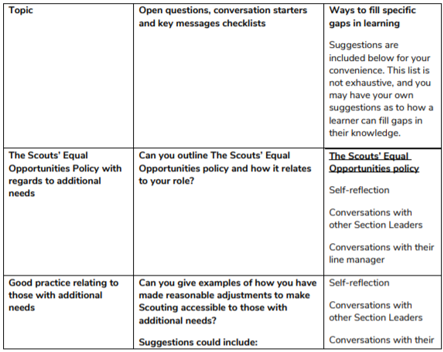
Part 2 - click to see the table in full screen.
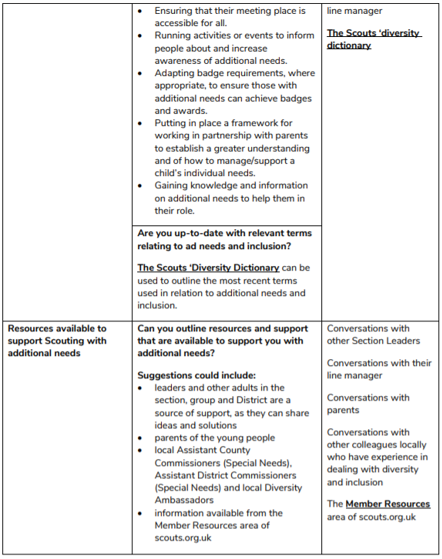
- Course
- One to one
- Small group
To validate this module the learner will need to complete two of the following:
- Show evidence of how they are making Scouting accessible to those with additional needs.
Evidence they could use may include one or more of the following: a visit from their Training
Adviser to an increasingly accessible meeting place, a sectional visit from their Training Adviser, notes showing how they have adapted badge requirements for a young person with additional needs, a programme plan showing adaptation to an activity to make in inclusive, a written or verbal statement to their Training Adviser by an observer showing how you have made adjustments to their meeting, programme or other Scouting elements to increase accessibility for those with additional needs, notes from a meeting with a parent or carer to make Scouting accessible to a young person with additional needs.
- Increase awareness of additional needs by running an activity or event for either young people
or adults.
Evidence they could use may include one or more of the following: a sectional visit from their
Training Adviser, a written or verbal statement for a Training Adviser or from an observer describing an activity or game they have run to increase awareness of additional needs, instructions for a game or activity they have run with the young people of the section.
- Any other ideas subject to agreement with their Training Adviser.
Additional validation criteria can be created in consultation with a Training Adviser if necessary. Any additional validation criteria created will need to check what you have learnt and that you can apply the skills that you have acquired to your role.
The list of evidence provided for each validation criteria is not exhaustive and there may be other forms of evidence that the learner may wish to use to validate this module. These can be agreed between you and the Learner. In addition to looking at the evidence the learner provides, you will need to review and prompt them to explain some elements of the evidence in order to ensure that they have applied their knowledge and understanding in their role.
Advising on Adult Appointments (37)
To enable an adult to participate fully as a member of the Appointments Advisory Committee.
- Understanding the structure of the Appointments Advisory Committee
- Understanding the responsibilities of the Appointments Advisory Committee
- Understanding the appointment process
- Knowing how to run effective approval meetings
Revalidation of this module is only required if this module is considered to be relevant to the new role.
What are the four stages of the appointment process and in what order do they happen?
The four stages of the appointment process are Application, Approval, Appointment and Induction.
The first three stages follow on from one another. Induction starts at the Application stage and continues throughout and (if necessary) after the other stages of the appointment process.
How can the appointment process be made welcoming and non-threatening?
The appointment process can be made welcoming and non-threatening by:
- Ensuring that the line manager has discussed the role and the appointment process with the adult, so they know what they are volunteering for and what to expect
- Explaining the purpose of the approval meeting and other elements of the appointment process so that the adult is put at ease
- Where possible, accompanying the adult at the approval meeting and introducing them to the committee members
- Ensuring that an effective induction takes place
- Ensuring that only three members of the Appointments Advisory Committee attend approval meetings
- Only asking questions which are relevant to the purpose of the approval meeting
Who is the Appointments Advisory Committee made up of?
The Appointments Advisory Committee is made up of an Appointments Chairman, an Appointments Secretary and a pool of committee members to undertake approval meetings.
What are the main responsibilities of the Appointments Advisory Committee?
The main responsibilities of the Appointments Advisory Committee are:
- Approval meetings: meeting with new adults to assess whether they are aware of and willing to uphold the values and policies of The Scouts and whether they understand the requirements of the role and are able to carry them out
- Reviews: supporting the review process, considering (with the line manager) the outcome of a review
- Change of appointment: considering applications for change of appointment and assessing if the applicant is able and prepared to carry out the role
- Cancellations: cancelling appointments when agreed with the line manager or relevant Commissioner and recording the reason for the cancellation
- Suspensions: following the suspension of an adult, recommending continuation of suspension, reinstatement, modification or cancellation of an appointment
- Disagreements: supporting the commissioner in the resolution of disagreements between adults
When arranging or running an approval meeting what factors might you need to consider?
There are some practical things that should be considered before an approval meeting. These include:
- Ensuring you have received relevant information from the adult’s AA Form and the agreed role description
- Ensuring you have all the information about the date, time and location of the meeting
- Making sure that the venue is welcoming (i.e. signage, size of room, temperature)
- Ensuring that you have a clear agenda for the meeting; and
- Ensuring that you have agreed the questions you will ask and who will be covering which areas.
What is the purpose of the approval meeting?
The purpose of the approval meeting is to consider:
- Whether the applicant is aware of (and by personal example prepared to uphold and promote) the values and policies of The Scouts – including making the Scout Promise, if appropriate; and
- Whether the applicant understands the requirements of the role and can carry them out
How many people should be present at an approval meeting?
Three members of the Appointments Advisory Committee should be present at the approval meeting. In some circumstances, the Appointments Chairman may allow one additional person to be present at the approval meeting, for example, if Module 37 (the training module for members of Appointments Advisory Committees) is being validated or if the applicant needs an interpreter/signer to attend the meeting.
What types of questions should be used at an approval meeting and why?
Open questions should be used as they allow more information to be gained from the adult. Open questions start with words such as why, how, who, what and if. They are questions to which a simple yes or no reply is not appropriate. They tend to help find out someone’s views, opinions and motivation in offering to help.
- Course
- One to one
- Small group
- DVD
To validate this module, the learner will need to:
Discuss with a Training Adviser the purpose of the appointment process in Scouting and steps that must be taken to ensure that it is welcoming, non-threatening and effective in appointing as far as possible only fit and proper persons.
And complete two of the following:
- Describe the appointment process
- Explain how the approval meeting should be prepared and conducted to ensure that it is nonthreatening to the adult
- Demonstrate effective questioning technique as part of the appointment process
- Arrange and take part in an effective approval meeting
- Describe the key items that should be checked to ensure that an individual is fit and proper to hold an appointment in Scouting
- Describe the responsibilities of the Appointments Advisory Committee
- Any other ideas, subject to agreement with a Training Adviser
And (if taking part in approval meetings):
Take part in approval meetings for two people. Discuss with your Training Adviser how the approval meetings were arranged and how the committee members reached their conclusions
Skills for Residential Experiences (38)
To provide adults with the appropriate skills to plan and run successful residential experiences for the young people in their section.
- The planning process
- Elements of effective administration
- Choosing and preparing a team
- Choosing, using and maintaining the right equipment
- Practical skills
- Health, happiness and safety issues
- Catering requirements
- Evaluating venues
This module should help to prepare adults in the skills and knowledge needed for the Nights Away Permit Scheme.
Please note that the Nights Away Permit Scheme is operated separately from the Adult Training
Scheme. The learner will be required to complete additional training and assessment separately from the completion and validation of this module if they wish to achieve a Nights Away Permit.
Revalidation of this module is only required if the new role contains a substantial increase in responsibility for residential experiences. The revalidation for this module should be discussed with your line manager and Training Adviser to determine whether it is necessary in your new role.
These questions follow the topics covered in the trainers notes and are directly linked to the learning objectives for this module. The questions are designed to support you when establishing what the learner already knows, and any gaps in the learner’s knowledge. Once these gaps have been identified, you should work with the learner to identify ways in which they can be filled.
Part 1 - click to see the table in full screen.
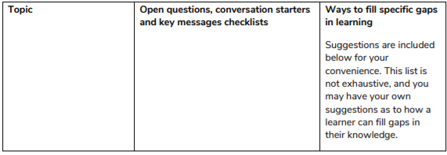
Part 2 - click to see the table in full screen.
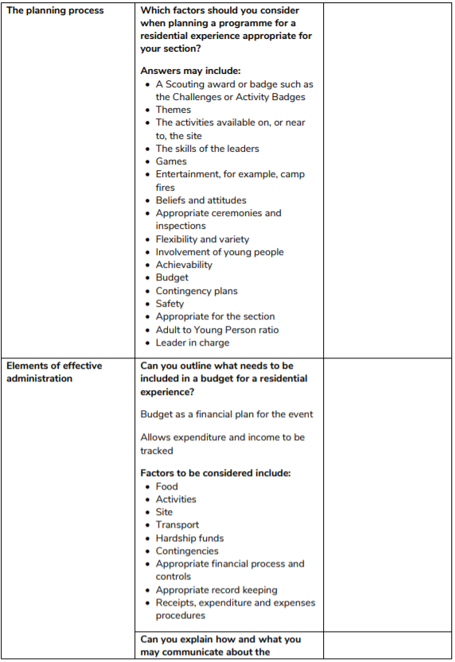
Part 3 - click to see the table in full screen.
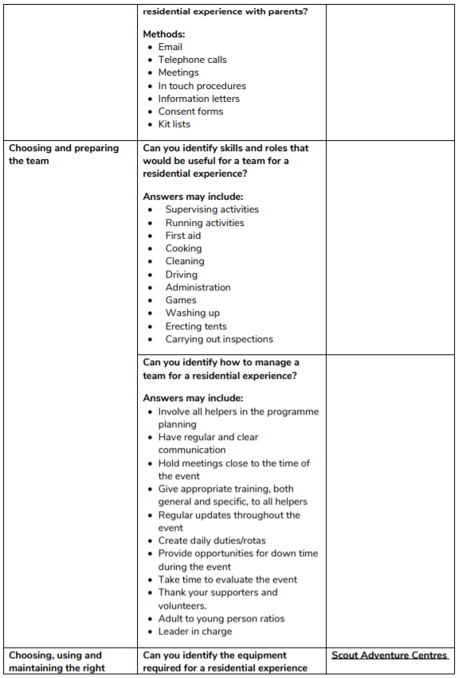
Part 4 - click to see the table in full screen.
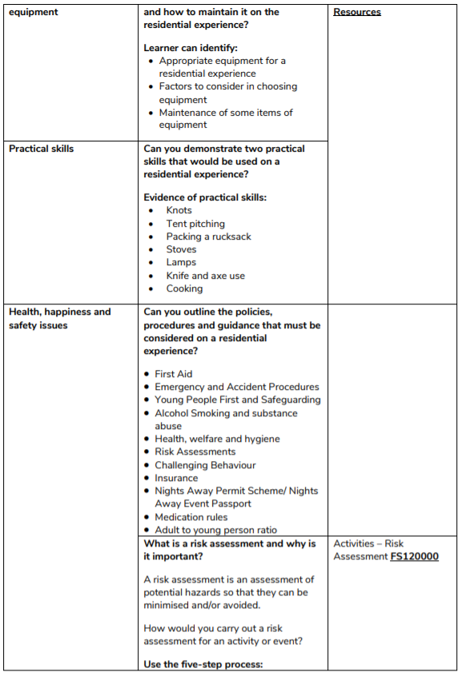
Part 5 - click to see the table in full screen.
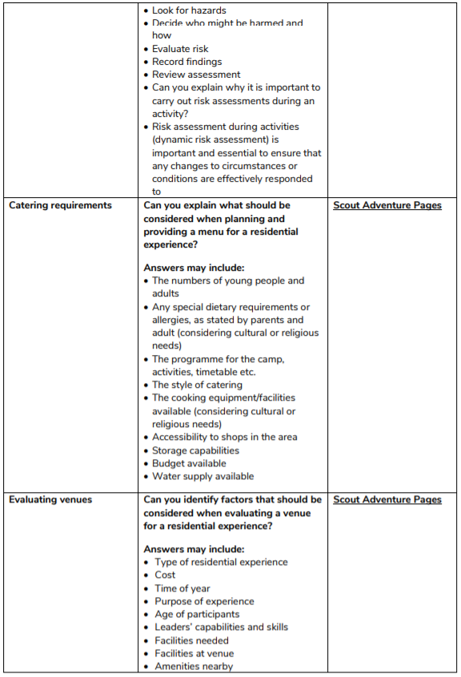
Part 6 - click to see the table in full screen.
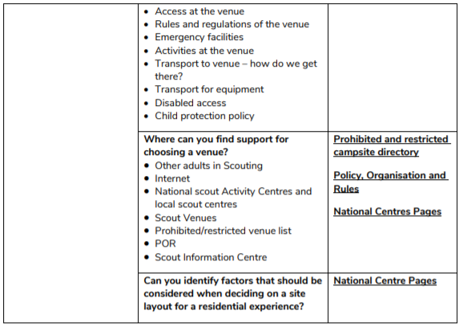
- Course
- One to one
- Small group
If the learner holds the Nights Away Permit, this will count as validation for this module.
To validate this module the learner will need to complete and provide evidence of one of the
following activities from each group:
Group 1: Planning and event administration
- Carry out a pre-camp visit; record and demonstrate their findings to select appropriate sites for different types of residential experience
- Show evidence of how the InTouch procedure, and nights away information form have been used for a camp or residential experience
- Carry out a risk assessment on a venue for a residential experience. Provide evidence and explain how and why risk assessments should be undertaken both before and during residential experiences
- Identify, select and justify appropriate group and personal equipment for at least two different styles of residential experience, for example, a kit list, a group equipment list
- Plan a suitable balanced menu for a camp or residential experience. Consider any specific dietary needs and identify the items and quantities required within an agreed budget.
Group 2: Using practical skills
- Demonstrate at least two different cooking methods for use on camps and residential experiences (for example open fires, gas and pressure stoves, hay box, camp oven, etc)
- Show how to pitch and strike at least two types of tent (for example patrol, dome, tunnel, hike, marquee, frame tent) and explain how to care for and maintain them
- Demonstrate the safe use of saws and axes. State the safety rules for their use, storage and transportation
- Set up an indoor venue in preparation of young people arriving for a residential experience, and explain your choice of room use, sleeping arrangements and safety considerations for any outdoor areas
- Demonstrate or explain tactics for dealing with homesickness in younger children
Group 3: Planning a programme
Plan a programme for a residential experience for the section you support, taking into consideration:
- A high-quality balanced programme
- Contingency plans
- Appropriateness of the programme for the section
- The role of residential experiences in the section programme and the development of young people
- Identify, plan and run opportunities for spiritual reflection at a camp or residential experience
- Any other ideas subject to agreement with your Training Adviser
Additional validation criteria can be created in consultation with the learner if necessary. Any additional validation criteria created will need to check the learner’s knowledge and that they can apply the skills acquired to their role in Scouting.
The list of evidence provided for each validation criteria is not exhaustive and there may be other forms of evidence that the learner may wish to use to validate this module. These can be agreed between you and the Learner. In addition to looking at the evidence the learner provides, you will need to review and prompt them to explain some elements of the evidence in order to ensure that they have applied their knowledge and understanding in their role.
Mentoring and Coaching (39)
To provide the skills, knowledge and attitudes necessary to effectively mentor and coach both adults and young people in Scouting Roles.
- Learning Styles
- Motivation
- Emotional Intelligence and Resilience
- Communication
- The GROW Model
- Giving Feedback
Revalidation of this module is not required for any change of role.
- Course
- One to one
- Small group
A ‘formal evidence portfolio’ is not required to validate as a Mentor or Coach. However documentary evidence will be required to show that the validation criteria has been achieved.
Example of this evidence may include:
- Discuss the training content and objectives of the Pre-Course Learning with a Training Adviser
- Complete a Mentoring and Coaching ‘How are we going to work together?’ with an adult you are supporting
- Meet with an adult you are supporting for a minimum of two sessions
- Effectively apply the TSA Mentoring and Coaching Approach with an adult you are supporting
- Effectively apply the Grow module with an adult you are supporting
- Complete a personal reflection log for a period of 3 months
- Any other ideas, subject to agreement with a Training Adviser
Notes
As coaching and mentoring sessions should be confidential, observation of these is not appropriate for
validation purposes.
Welcome Conversation learning
Understand why we have Welcome Conversations, know how to prepare for a Welcome Conversation and be able to deliver a Welcome Conversation.
- Why we have Welcome Conversations
- How to prepare for a Welcome Conversation and be able
- How to deliver a Welcome Conversation
e-learning
To validate the Module, you will need to:
- Complete the assessment at the end of the eLearning module, this will generate a certificate, the certificate is the validation needed for this training module.
Question 1:
-
Incorrect – As a Welcome Conversation Volunteer from a Beavers Section, you're able to deliver Welcome Conversations to any new volunteer. It's ideal if you're in a similar role (but not in the same Group) as a new volunteer, so then you can deliver it to other Squirrels, Beavers or Cubs Section Team Members too. This is because you're likely to have connections that'll make the new volunteer feel at ease and you're able to answer any programme or age group specific questions. Also remember, you need to be flexible and open to the new volunteer's availability and preferences. Try and meet them when and where they suggest. We want them to feel welcomed and that Scouts works for them.
-
Incorrect – By chatting with the new volunteer at their meeting place, you're making them feel more comfortable and at ease. But, their line manager (Group Lead Volunteer / Group Scout Leader) still needs to be at the conversation with you as well. We don't want the new volunteer having to attend two conversations instead of one, as that isn't as friendly and could be off-putting. Also, they'll probably feel more comfortable and relaxed with their Team Leader present, as they're a familiar face.
-
Correct! - You've been open to the needs of the new volunteer and made it accessible for them to meet you. All three of you have arranged the Welcome Conversation together so it's convenient for everyone. Now, the new volunteer can have one conversation where they're also supported by their line manager (Group Lead Volunteer / Group Scout Leader).
Question 2:
-
Incorrect – It's important to challenge someone who doesn't share our values, but these comments are concerning and could be examples of direct discrimination. You should have a more serious conversation with your District Lead Volunteer / District Commissioner about whether this person's suitable to volunteer with young people. Remember, all adult members of Scouts need to be positive role models at all times.
-
Correct! - They've made some concerning comments, which could be examples of direct discrimination. They're also displaying traits which don't align with our values. The next step would be to discuss this with your District Lead Volunteer / District Commissioner, as this person doesn't seem like a good fit for Scouts. Remember, all adult members of Scouts need to be positive role models at all times.
-
Incorrect – They've made some very concerning remarks during your conversation. It's not right for you to agree a start date for them without further discussion with your District Lead Volunteer / District Commissioner. As they failed to turn up to their initial conversation, it's also important to discuss their availability and make sure they have time to volunteer. We appreciate sometimes people can't attend but it’s important to communicate in advance.
Question 3:
-
Incorrect – All adult members in Scouts need to understand the Yellow Card, so they can help keep young people safe. Even if volunteers are supervised, they may come across a situation where a young person tries to share a concern with them. If they don't understand the Yellow Card, then they won't know what they need to do to keep that young person safe.
-
Incorrect – It's common for family members to volunteer together at Scouts. However, it's important that all our adult members have the capacity to understand the Yellow Card, so they can keep young people safe, even if they're also supported by a family member while volunteering. If they don't understand the Yellow Card, then this could put young people at risk, meaning they wouldn't be suitable to hold an adult role at Scouts.
-
Correct! - You'll need to discuss this further with your District Lead Volunteer / District Commissioner. Chat about who'd be best placed to let the potential volunteer know that understanding the Yellow Card is an important part of volunteering at Scouts. Make sure someone checks the volunteer’s understanding of it again once they’ve completed their safeguarding Learning. All adult members in Scouts must be able to understand and follow the Yellow Card. If the potential volunteer can't do this, they're not right for Scouts.
APPENDIX 1: Personal Learning Plan Template
APPENDIX 2: Useful Resources
The Support Centre is your first point of contact for The Scouts. You can ask questions, receive advice and order resources. The Support Centre is open from 9am – 5pm weekdays and can be contacted by:
Live chat: www.scouts.org.uk
Phone: 0345 300 1818 (local rate) or 0208 433 7100
Email: support@scouts.org.uk
Post: Scout Support Centre, Gilwell Park, Bury Road, Chingford, E4 7QW
This document outlines The Scouts’ approach to adult training, the details of the training scheme and the local management of training provision. Also includes information on the minimum module requirements for the different roles in The Scouts. Take a look at the Adult Training Scheme.
This is a resource that volunteers work through as through the Adult Training Scheme. It includes details of all training for Section Leaders and Assistant Section Leaders within the scheme.
The Adult’s Personal File for Non-Wood Badge roles is a shorter version of the Adult’s Personal File with only relevant modules included for these roles. This has been developed to ensure that the support resource is as relevant as possible for members who are not required to undertake a Wood Badge as part of their role.
The Supplementary Module Pages will be useful for members who choose to undertake any of the supplementary modules. These can be printed and inserted into any of the Adult’s Personal Files or referred to online. The Supplementary Module pages for the Adult’s Personal File can be accessed in one document with all the Supplementary Modules or the individual module pages are also available.
Quick-glance guide to the modules in the Adult Training Scheme.